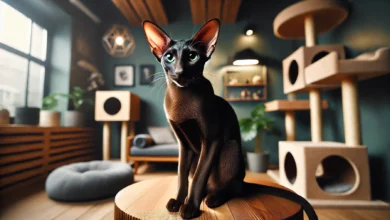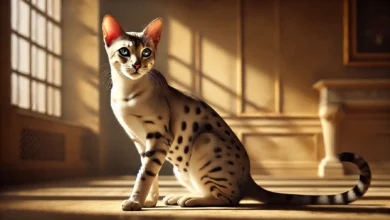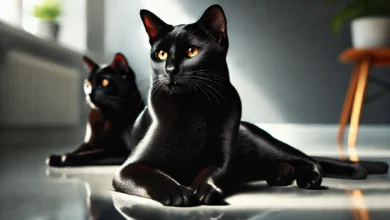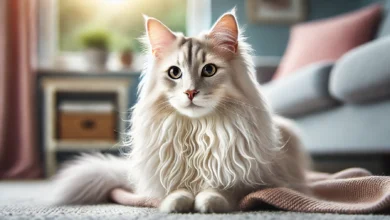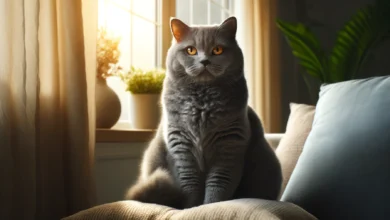Discovering Maine Coon Cats: History and Behavior
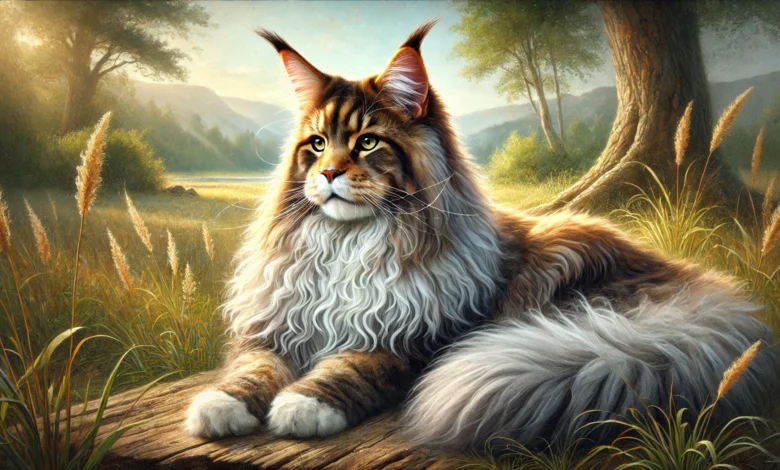
The Maine Coon often stands out when choosing a breed because this variety is known for its size, gentle nature, and rich history.
Many of the characteristics, such as their physical attributes, have made them unique, especially their friendliness, which brightens the eyes of cat lovers around the world.
Whether you are a seasoned cat lover or a new parent of cats, there is something special about the Maine Coon that intrigues everyone who comes across them.
In this article, we delve deep into the history and behavior of Maine Coon cats, shedding light on why they are such brilliant companions.
First, let’s explore where these magnificent creatures come from and what makes them so special.
Table of Contents
History and Origin of Maine Coon Cats
Just like the breed itself, the story of Maine Coon cats is quite fascinating.
As one of North America’s oldest natural cat breeds, their history is filled with myths, legends, and a touch of mystery.
Although native to the United States, the true origin of this breed is still debated among cat historians and enthusiasts.
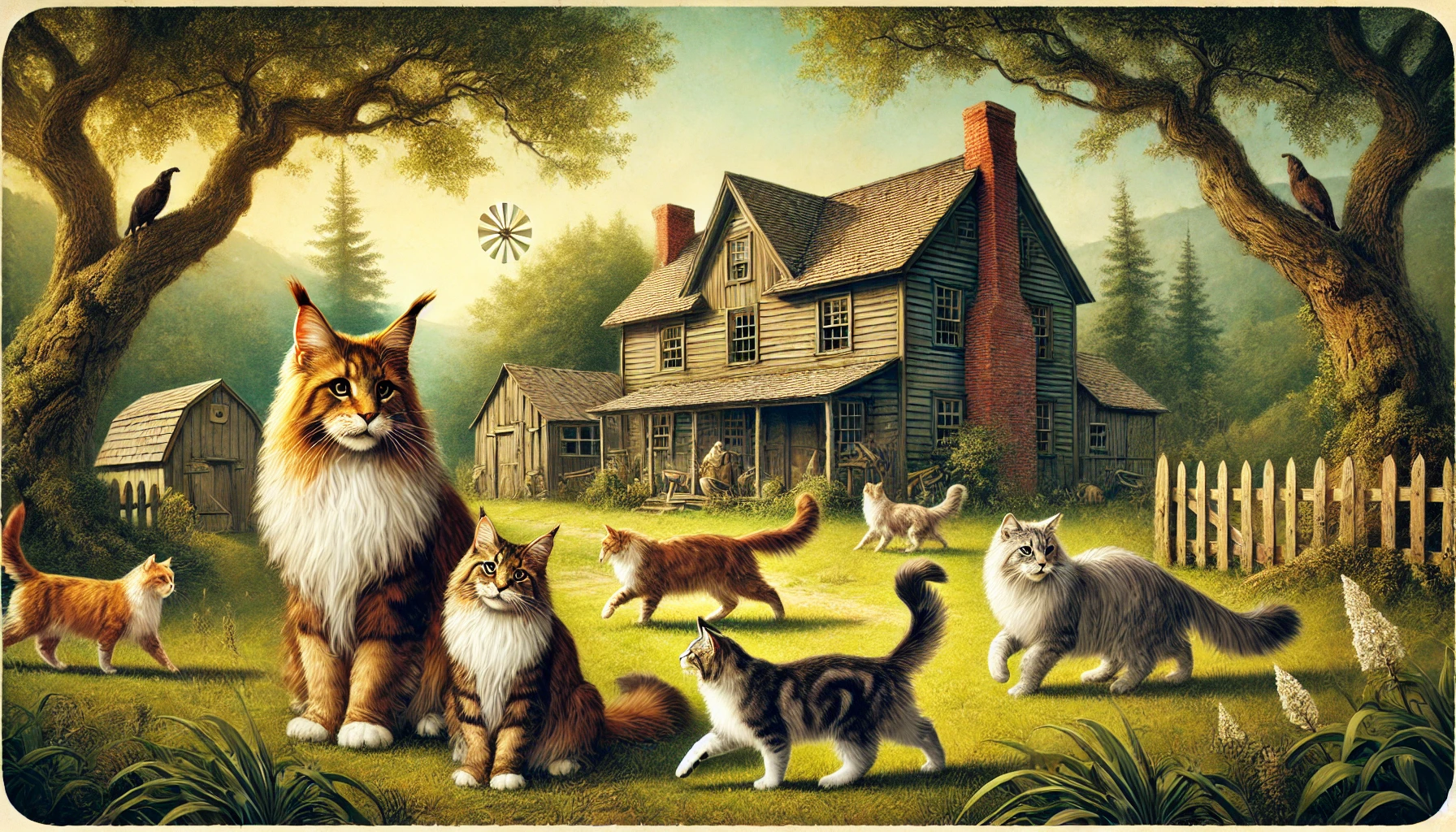
Early History of the Maine Coon Breed
The Maine Coon is so-named because it supposedly originated in the state of Maine.
Some records indicate that it has existed since the early 19th century.
These cats were probably the result of crossbreeding between native short-haired cats and long-haired breeds brought by European settlers.
Their large size, thick fur, and bushy tails suggest that this breed adapted to survive outdoors during Maine’s harsh winters.
Interestingly, the Maine Coon is the official state cat of Maine, further demonstrating how long this breed has been resident and significant in the region.
Maine Coons thrived in cold weather conditions and were exceptionally good hunters, making them a favorite of farmers who needed effective mousers.
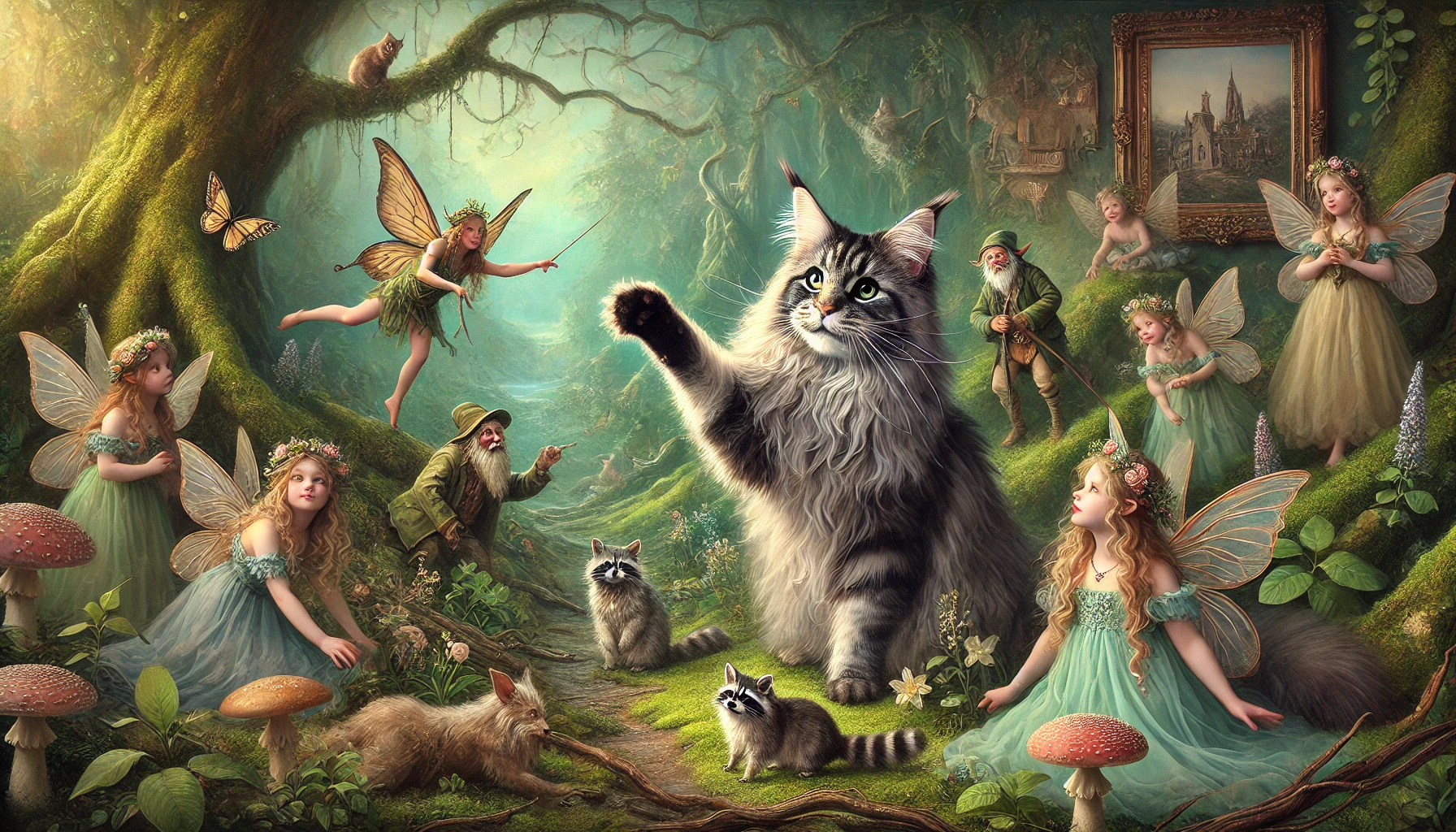
Legends and Myths Surrounding Maine Coons
The roots of Maine Coon cats are steeped in folklore.
One popular story claims that the breed originated from a liaison between a domestic cat and a raccoon, a theory which is scientifically impossible but humorous given the raccoon-like appearance of their tails.
Another tale links their ancestry to Marie Antoinette’s long-haired cats, which were supposedly shipped to America before her execution.
While none of these tales can be verified, they add to the mystique of the Maine Coon.
There is also a Viking connection to the Maine Coon’s origins.
Some say they may be related to the Norwegian Forest Cat, brought to America by Norse explorers around the 11th century.
This theory holds some merit based on physical similarities, as both Maine Coons and Norwegian Forest Cats have thick, water-resistant coats and sturdy builds.
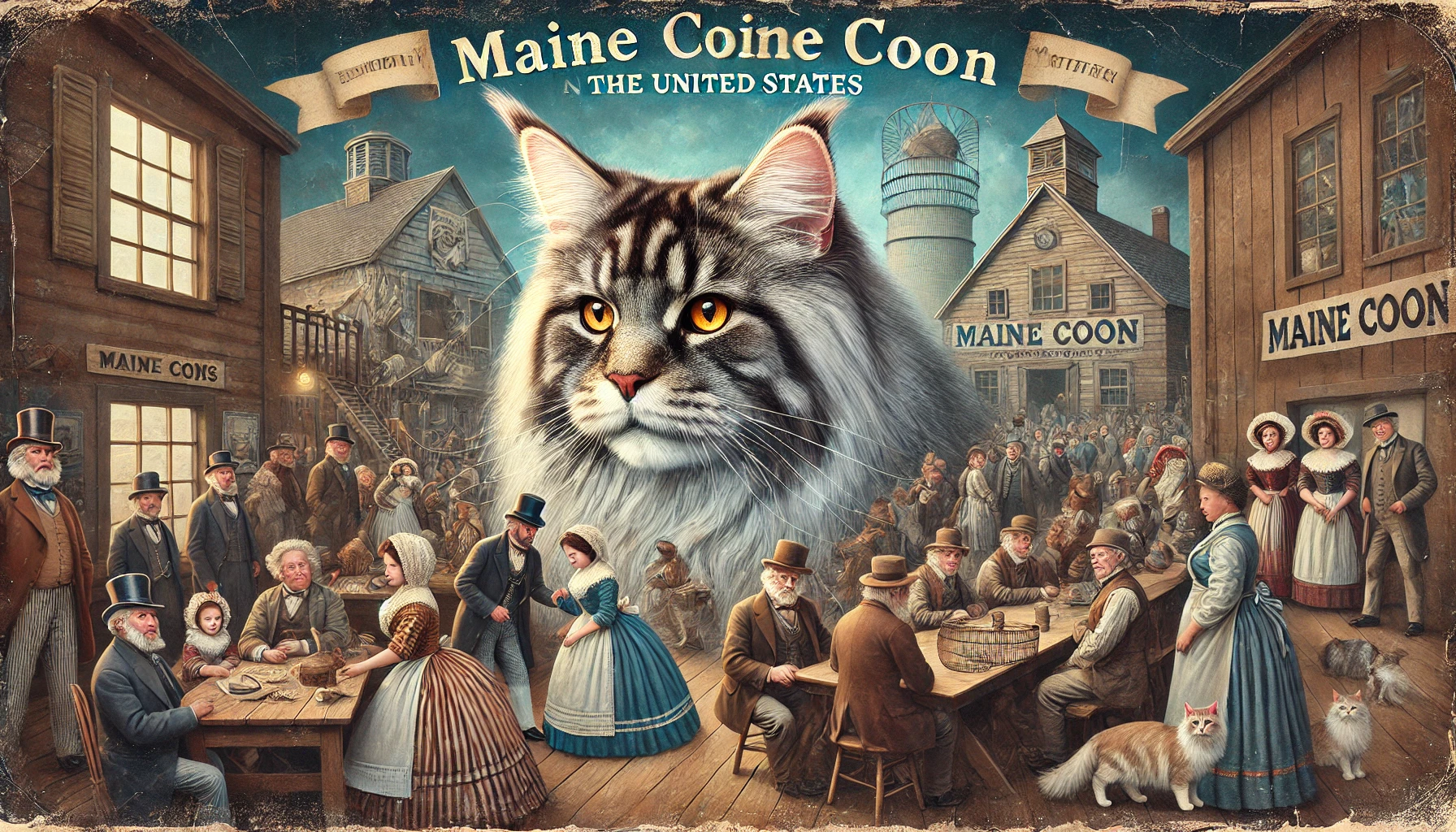
Development of Maine Coons in the United States
As the breed gained popularity in the late 1800s, Maine Coon cats started appearing in cat shows across the country.
In fact, a Maine Coon won the first documented cat show held in the U.S.
at Madison Square Garden in 1895.
However, the breed fell out of favor in the early 20th century, as more exotic long-haired breeds like the Persian began dominating cat shows.
It wasn’t until the 1950s and 1960s that Maine Coons made a comeback, eventually becoming one of the most popular cat breeds in the world.
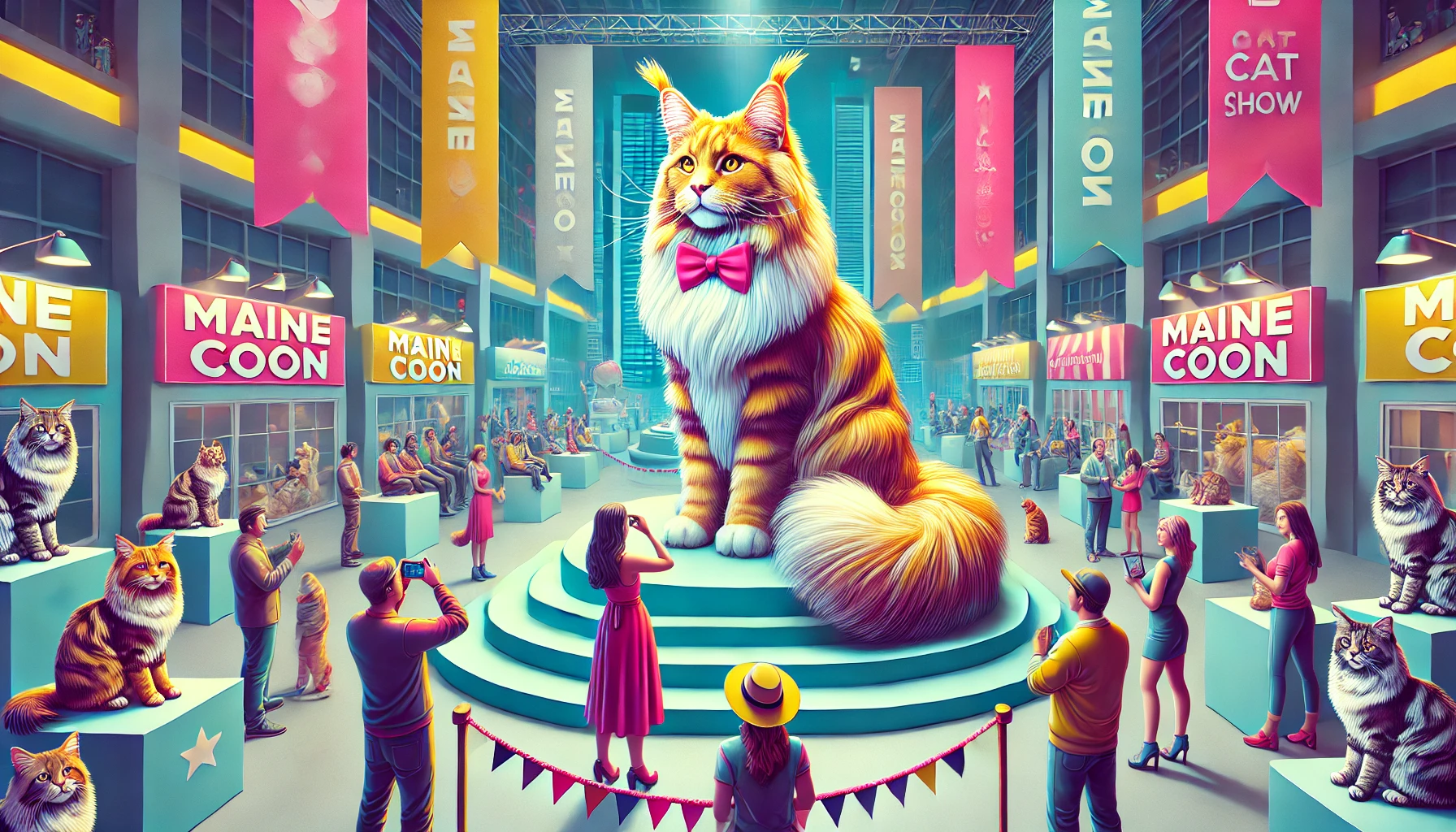
The Rise of the Maine Coon in Popularity
Today, Maine Coon cats are considered one of the most popular breeds worldwide.
Their loyalty, gentleness, and impressive size and appearance make them a favorite among cat enthusiasts.
The breed’s resurgence in popularity during the mid-20th century can also be attributed to cat associations recognizing and promoting Maine Coons.
These cats have traveled a long road from working farm animals to beloved family pets, and today they are superstars in cat shows across the globe.
The Maine Coon’s origin remains a captivating mystery with multiple theories involving European settlers, the state of Maine, and even Norse explorers.
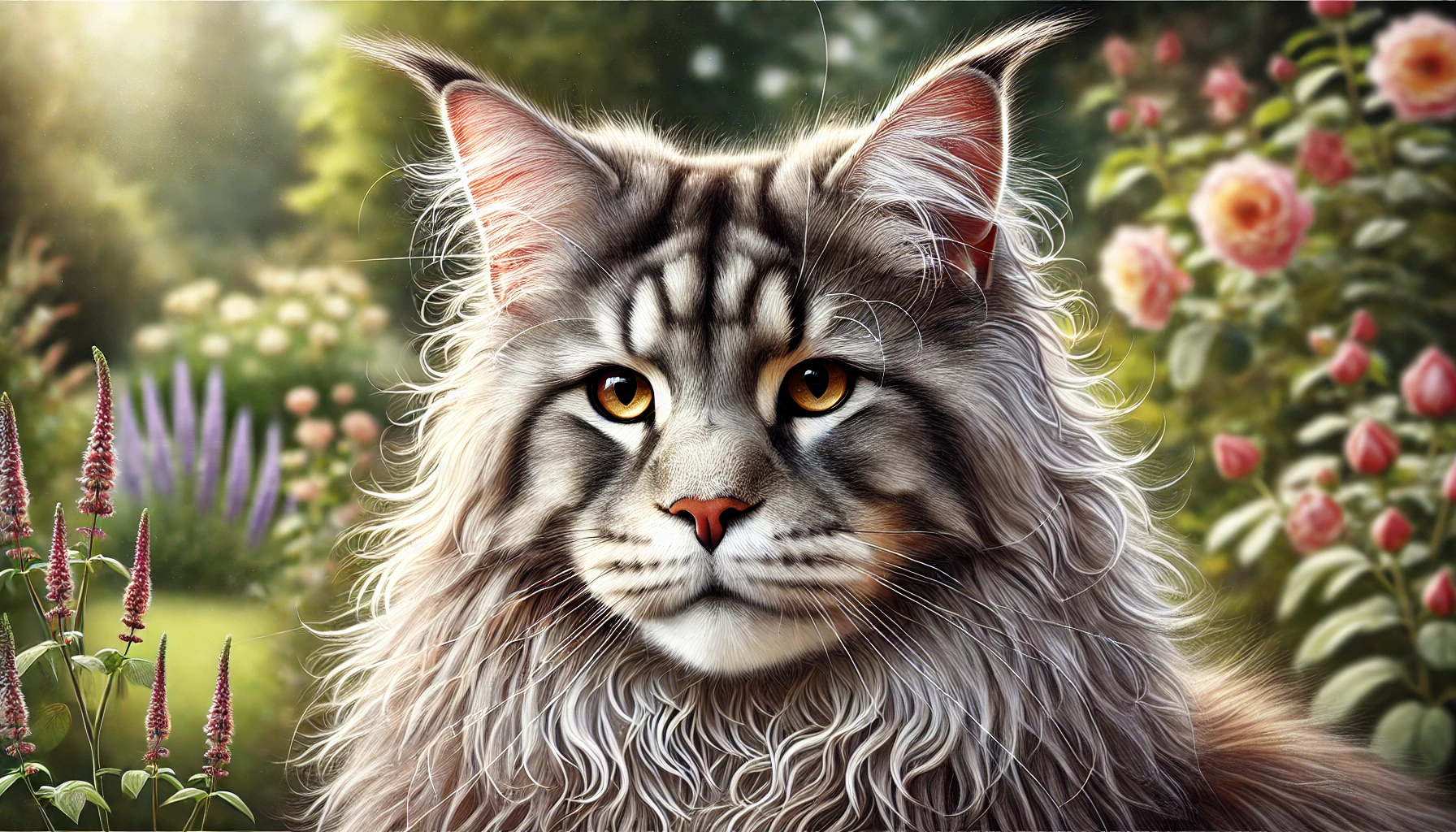
Physical Characteristics of Maine Coon Cats
Maine Coon cats are not only known for their friendly nature, but they are also recognized for their large size and impressive appearance.
As one of the largest domesticated breeds of cats, Maine Coons are easily identified by their muscular body and unique physical features that set them apart in the feline world.
If you’re planning to get a Maine Coon, it’s important to understand what makes this breed so special.
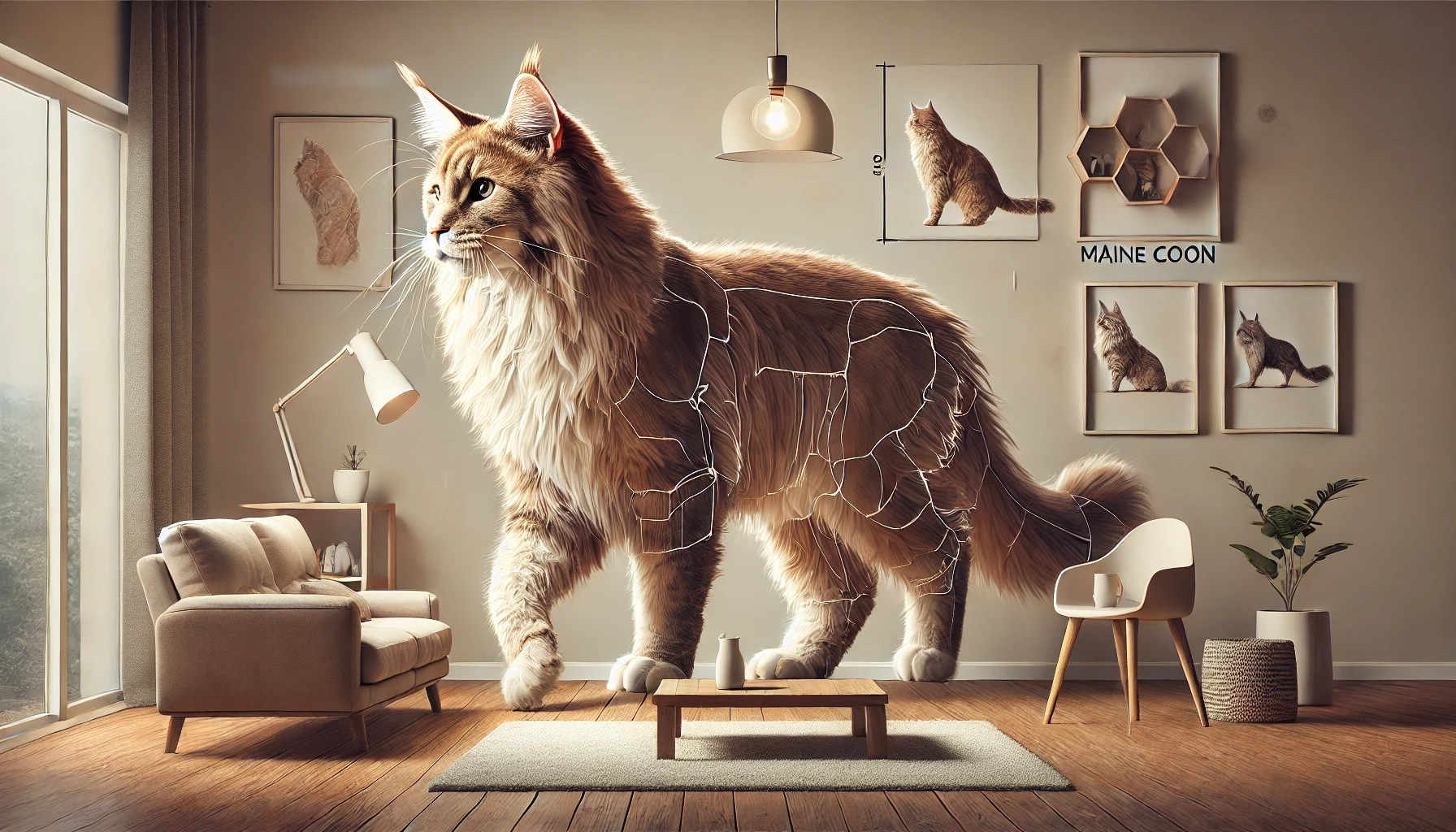
Size and Structure of Maine Coon Cats
The Maine Coon is a large cat breed.
Males typically weigh between 13 to 18 pounds, while females usually range from 8 to 12 pounds, although some males can exceed 20 pounds.
They have a muscular build, giving them a powerful appearance, and they often have long bodies.
Fully grown Maine Coons can reach up to 40 inches in length, including their bushy tails.
Aside from their size, Maine Coons have a broad chest and sturdy legs, contributing to their overall solid and sturdy build.
Despite their large size, Maine Coons are surprisingly agile and graceful, capable of quick movements and high jumps that are unexpected for their weight.
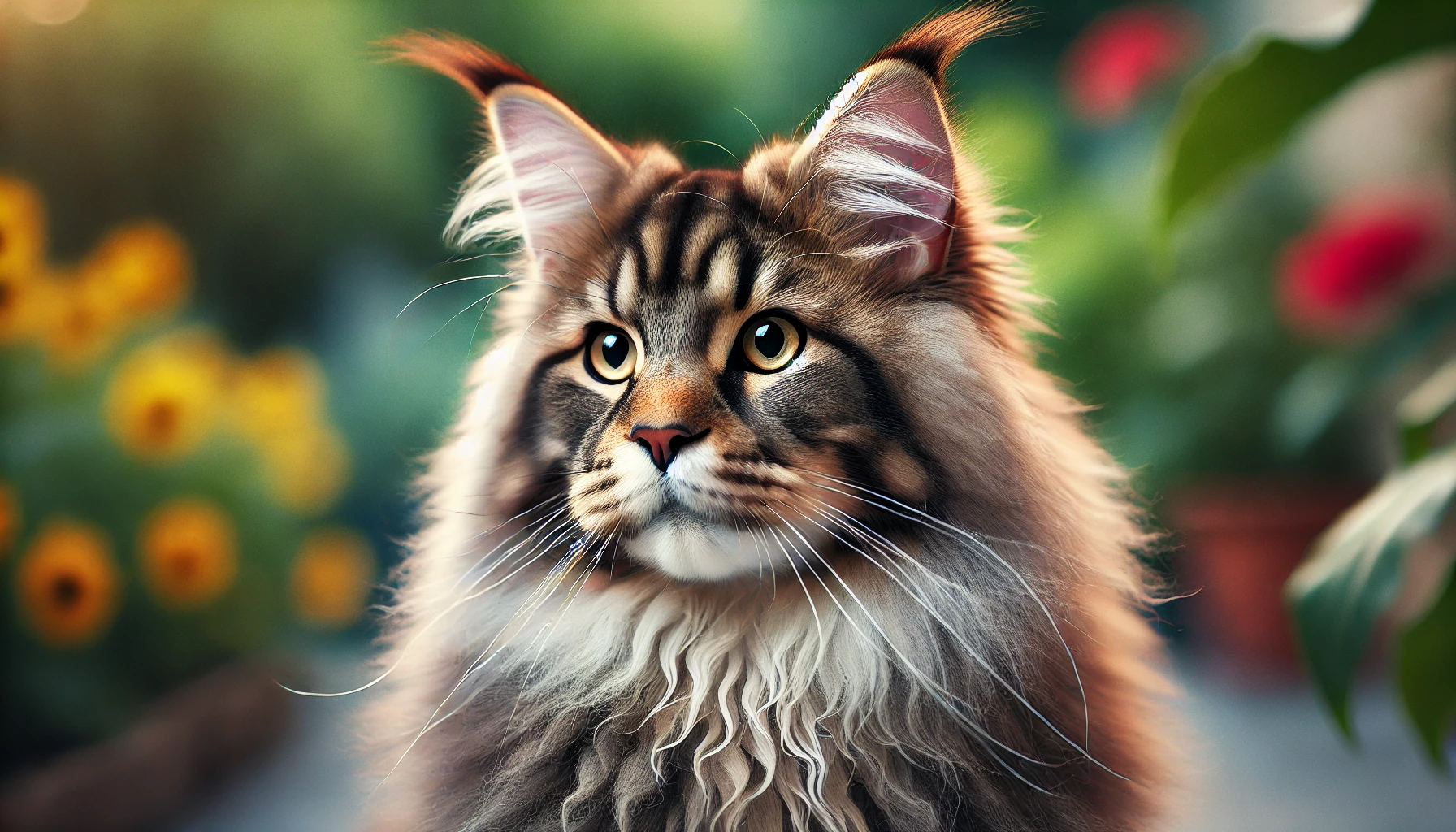
Distinctive Features: Fur, Ears, and Tail
One of the standout features of Maine Coon cats is their coat.
Their fur is thick and water-resistant, with a soft undercoat and a longer, coarser outer coat.
This double-layered coat allows them to withstand cold weather conditions and protects them from harsh environmental elements.
The fur around their neck and chest often forms a ruff, giving them a manelike and regal appearance.
Another distinctive feature of Maine Coons is their large, tufted ears.
The tips of their ears have tufts of hair, commonly known as lynx tips, which help protect their ears from snow and dirt.
Their ears are set high on their heads, giving them an alert and attentive look.
Maine Coons also have long, bushy tails, which they can coil around themselves for warmth.
The tail, thick and raccoon-like, is one of the breed’s most iconic features and may even contribute to the origin of the breed’s name.
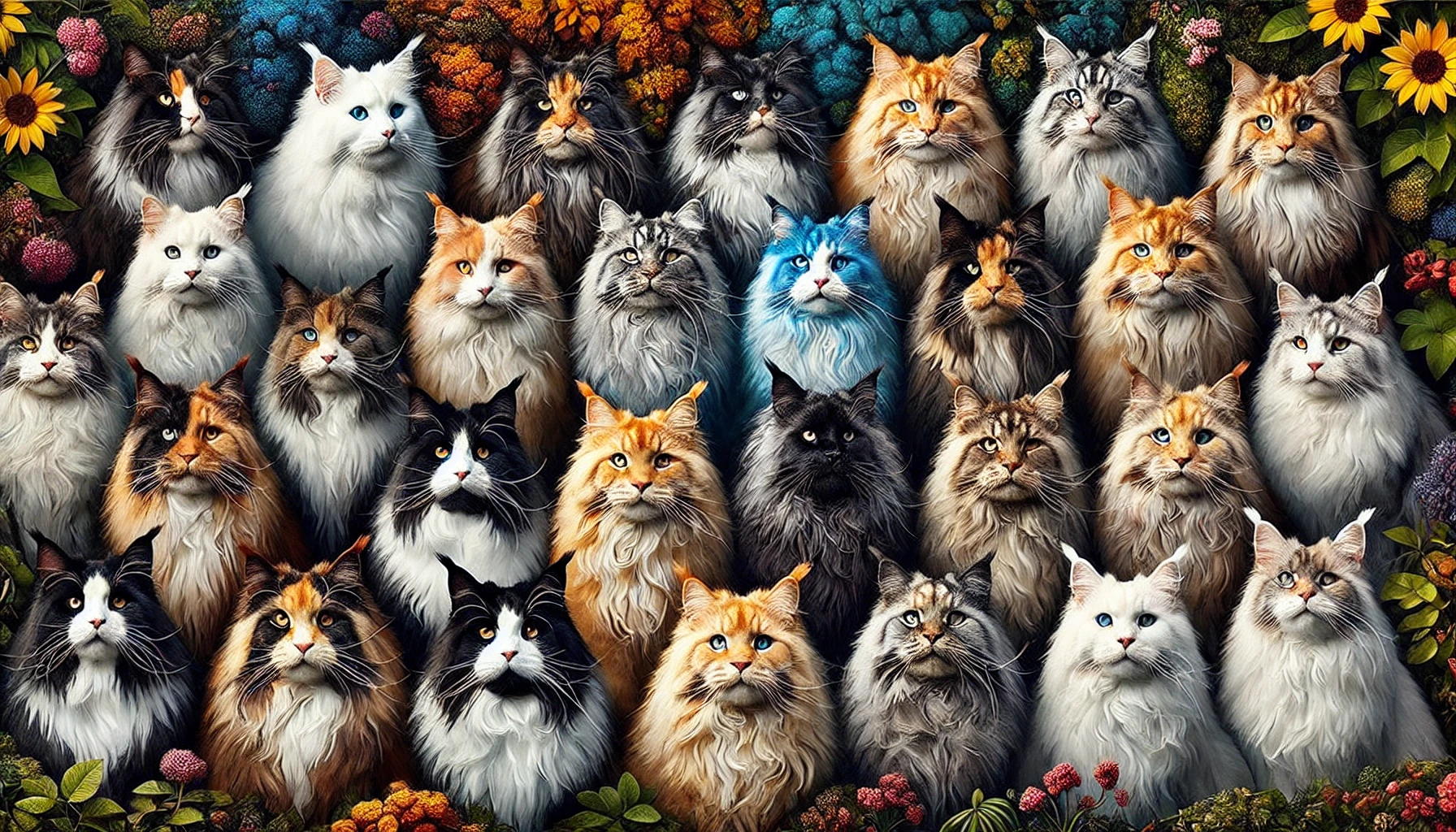
Color Variations in Maine Coon Cats
One of the most exciting things about Maine Coon cats is the wide array of colors and patterns they come in.
Maine Coons can be found in almost any color or pattern, including:
- Solid colors: black, white, blue, cream
- Tabby patterns: classic, mackerel, ticked
- Bi-color combinations: black and white, blue and white
- Tortoiseshell and calico patterns
While Maine Coons can appear in many colors, the brown tabby is one of the most iconic and recognizable patterns.
Their striking coats ensure they never go unnoticed, adding to their charm and popularity.
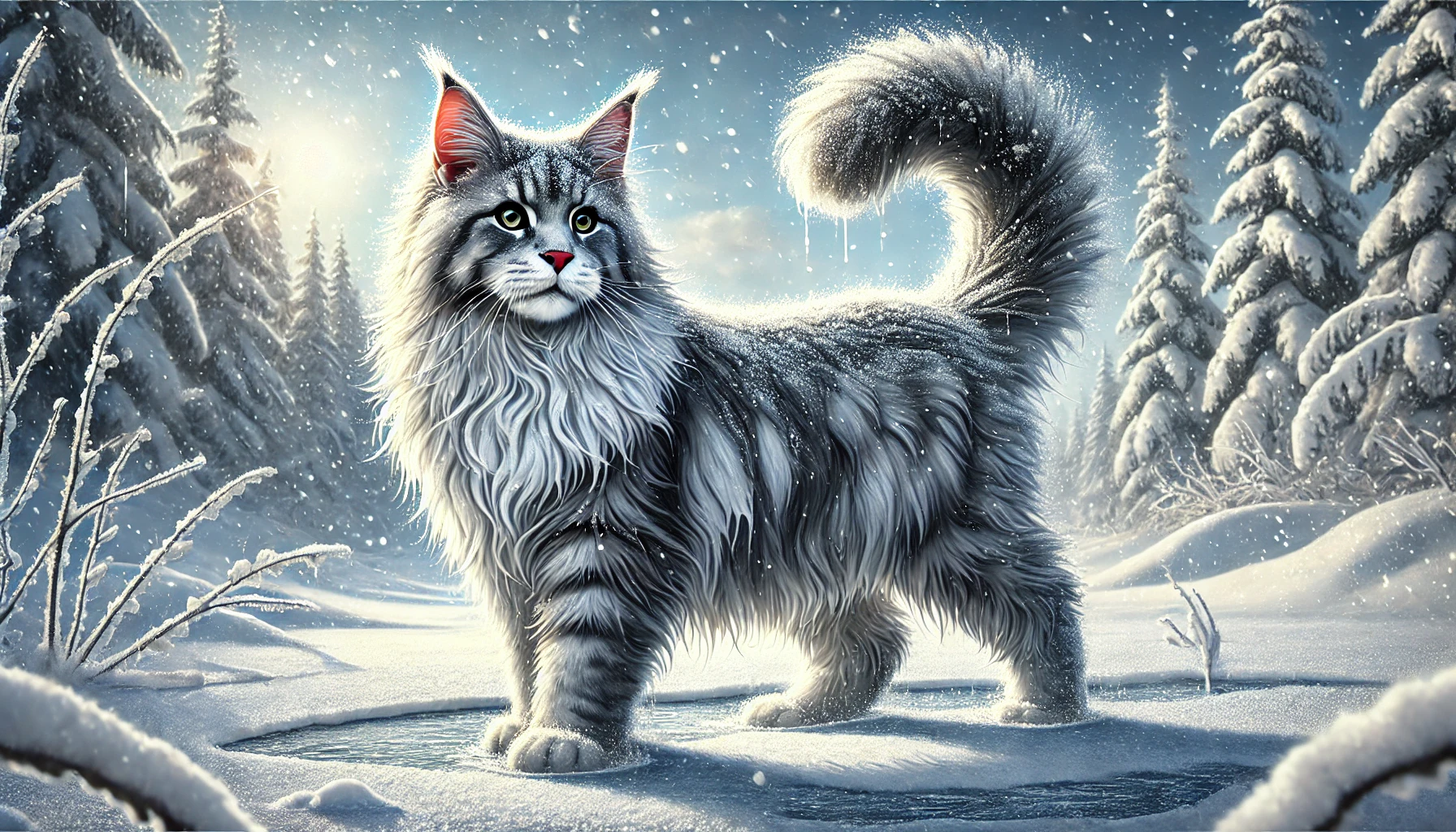
Unique Adaptation to Climate by Maine Coon
The Maine Coon has adapted well to cold climates, particularly in its native New England.
Their thick, water-resistant fur keeps them warm in extremely cold conditions, while their large, tufted paws act like snowshoes, making it easier for them to walk on snow.
These features not only enhance their beauty but also highlight their resilience in harsh environments.
Maine Coons’ long tails are more than just decorative.
In cold weather, they use their tails to wrap around themselves, keeping warm and comfortable, showcasing how practical their unique features are in helping them survive in colder climates.
Maine Coons are known for their large size, sturdy build, and luxurious, water-resistant coats, making them well-adapted to cold climates.
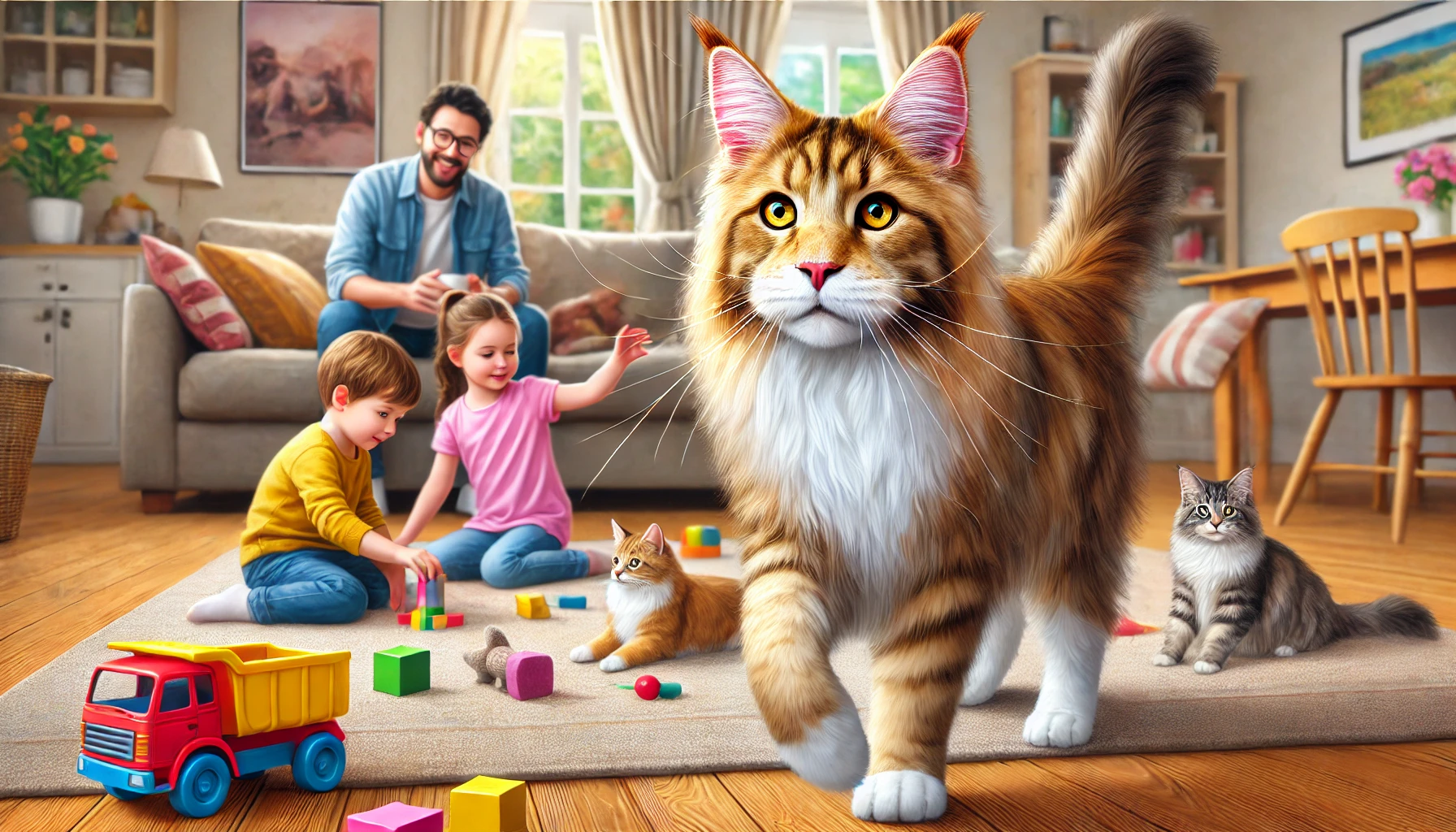
Maine Coon Cat Behavioral Traits and Personality
Besides their large size and striking features, Maine Coon cats are famous for their agreeable personalities.
They are very friendly, clever, and adaptive to many kinds of homes.
Whether you live alone or with a family, Maine Coons won’t disappoint—they are social and laid-back, making them a perfect addition to any household.
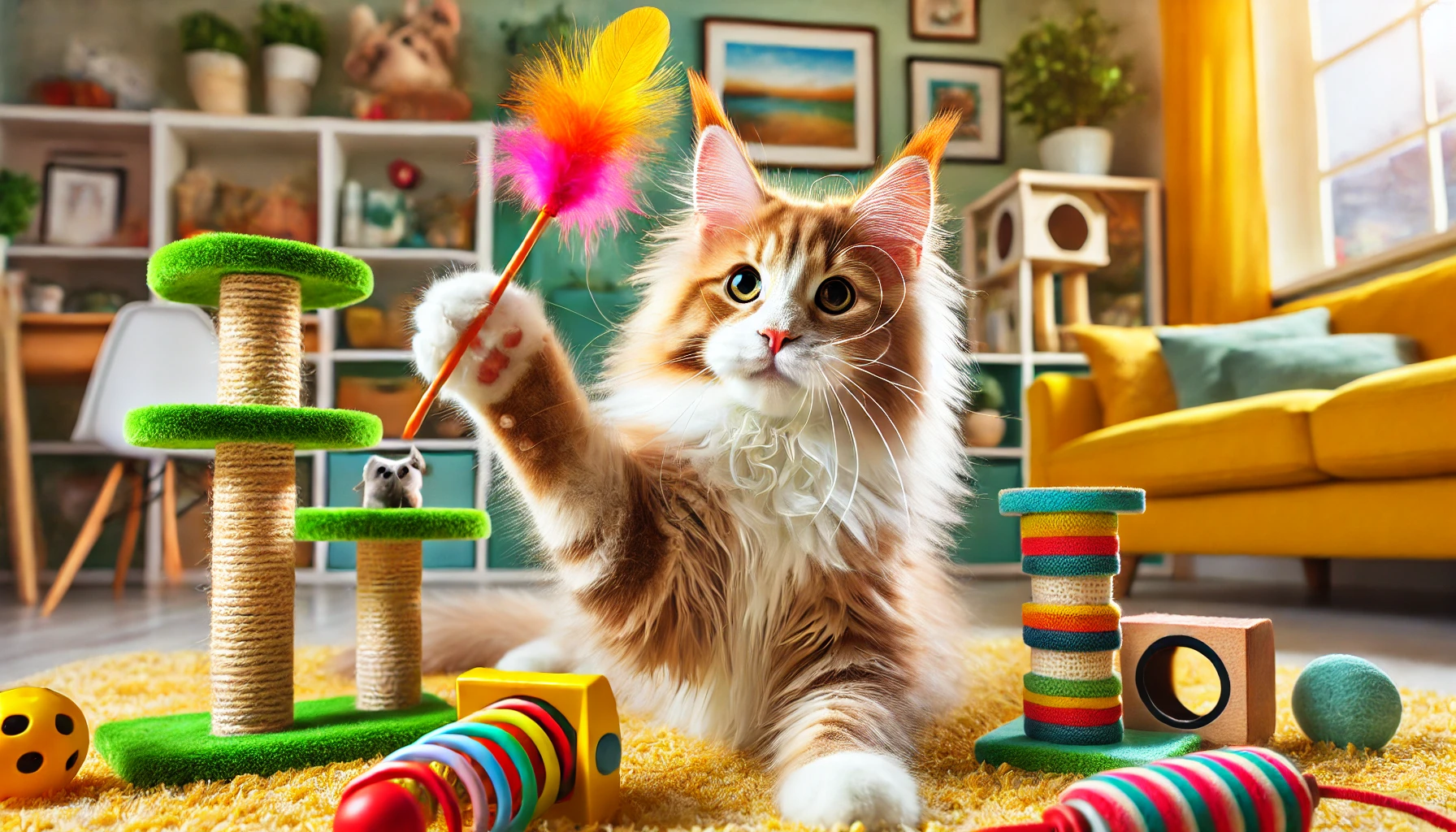
Intelligence and Playfulness of Maine Coons
Maine Coons are quite vocal and intelligent.
They are often referred to as problem-solvers due to their ability to learn tricks and even play fetch like their canine counterparts.
This intelligence makes them very inquisitive, and they will spend hours exploring new surroundings.
You might find your Maine Coon investigating every nook of your home or figuring out how doors and cabinets open.
In addition to their intelligence, Maine Coons are extremely playful.
Their kitten-like energy tends to stay with them well into adulthood, making them fun companions.
They can entertain themselves for hours with toys that challenge their minds, such as puzzle toys or interactive games.
Because of their playful and curious nature, Maine Coons are perfect for families with children, as they love to engage with their human family members.
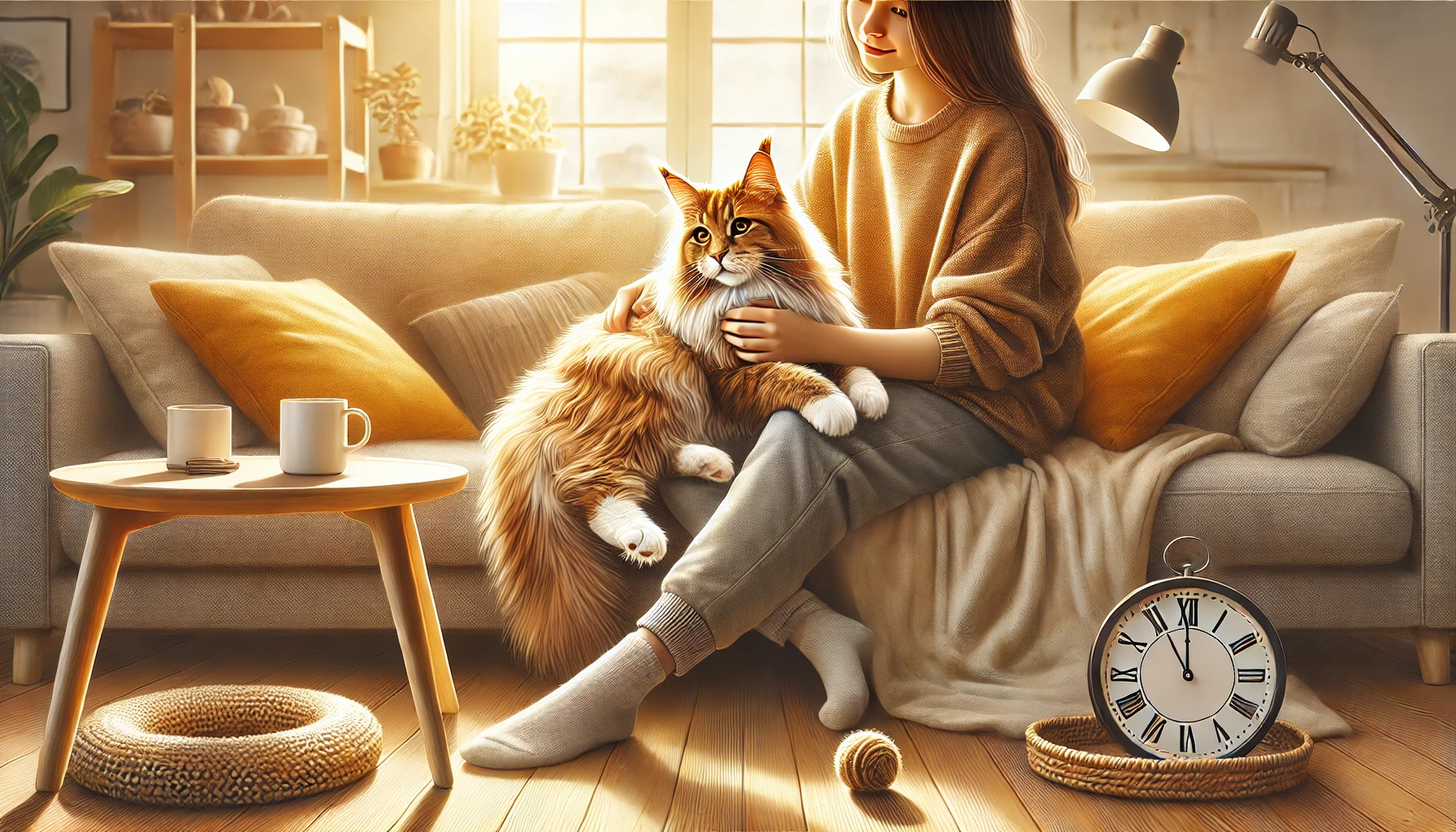
Social Behavior: How Maine Coons Behave Around Humans
Despite their large size, Maine Coons are extremely gentle.
They are affectionate and love spending time with their owners.
However, unlike some breeds, they are not overly demanding of attention.
Maine Coons enjoy being around their family members but are often content sitting nearby rather than directly on their owner’s lap.
Maine Coons tend to form strong attachments to their human families.
Known for their loyalty, they often follow their owners from room to room, showing curiosity about what’s going on.
Although they are not typically lap cats, they love being close to their family and can often be found lounging in the same room.
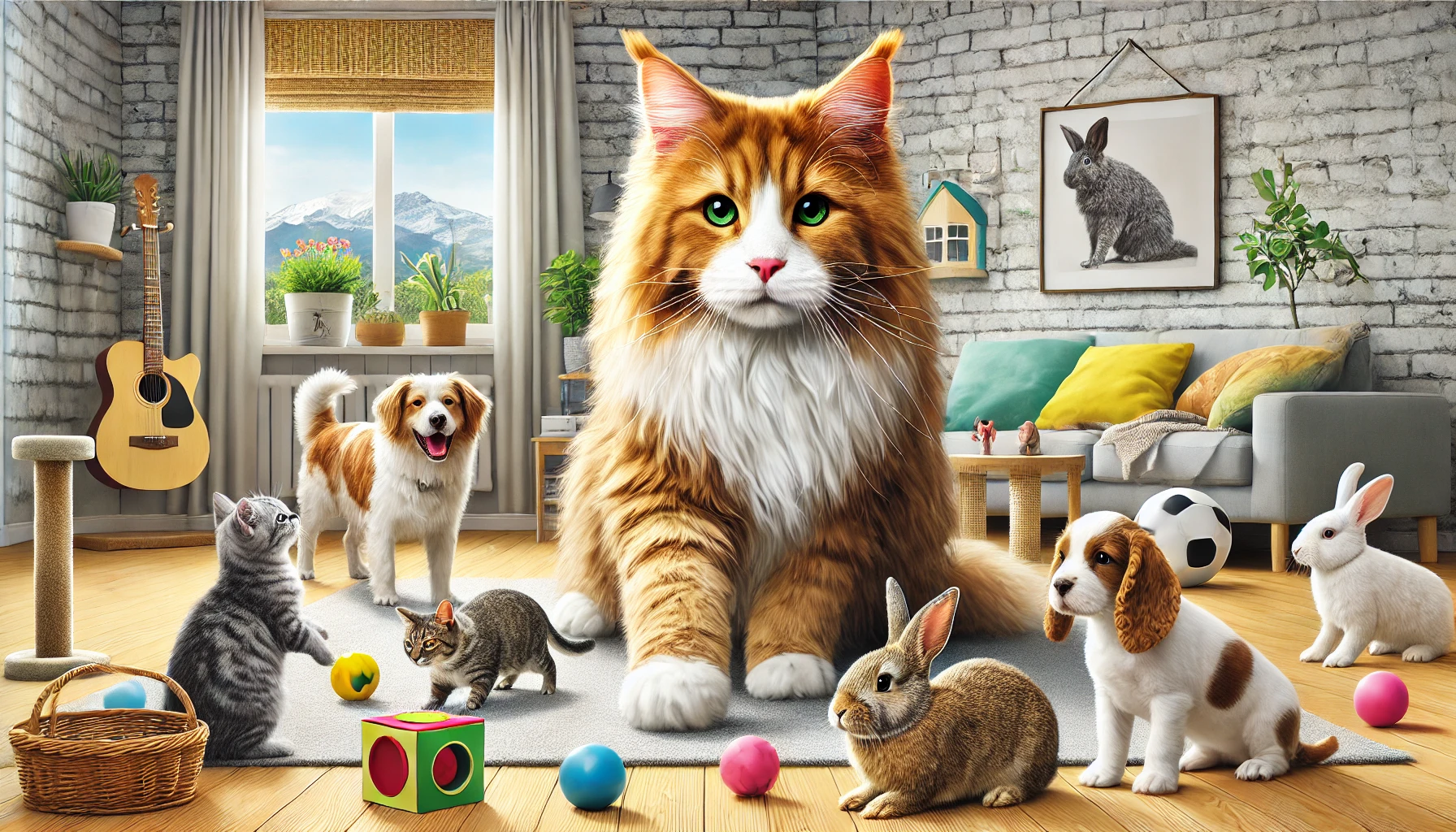
Maine Coons and Their Adaptability with Other Pets
Maine Coons are highly adaptable when it comes to living with other pets, whether dogs or cats.
Their calm nature allows them to get along well with other cats and even dogs.
Of course, each cat has its own personality, but generally, Maine Coons are very accepting of new animals in the household, making them a great choice for multi-pet homes.
Their playful yet non-aggressive temperament also means that Maine Coons are usually not bothered by smaller animals, such as rabbits or birds.
However, it’s important to monitor interactions, especially during the first few days, to ensure all pets feel safe and comfortable.
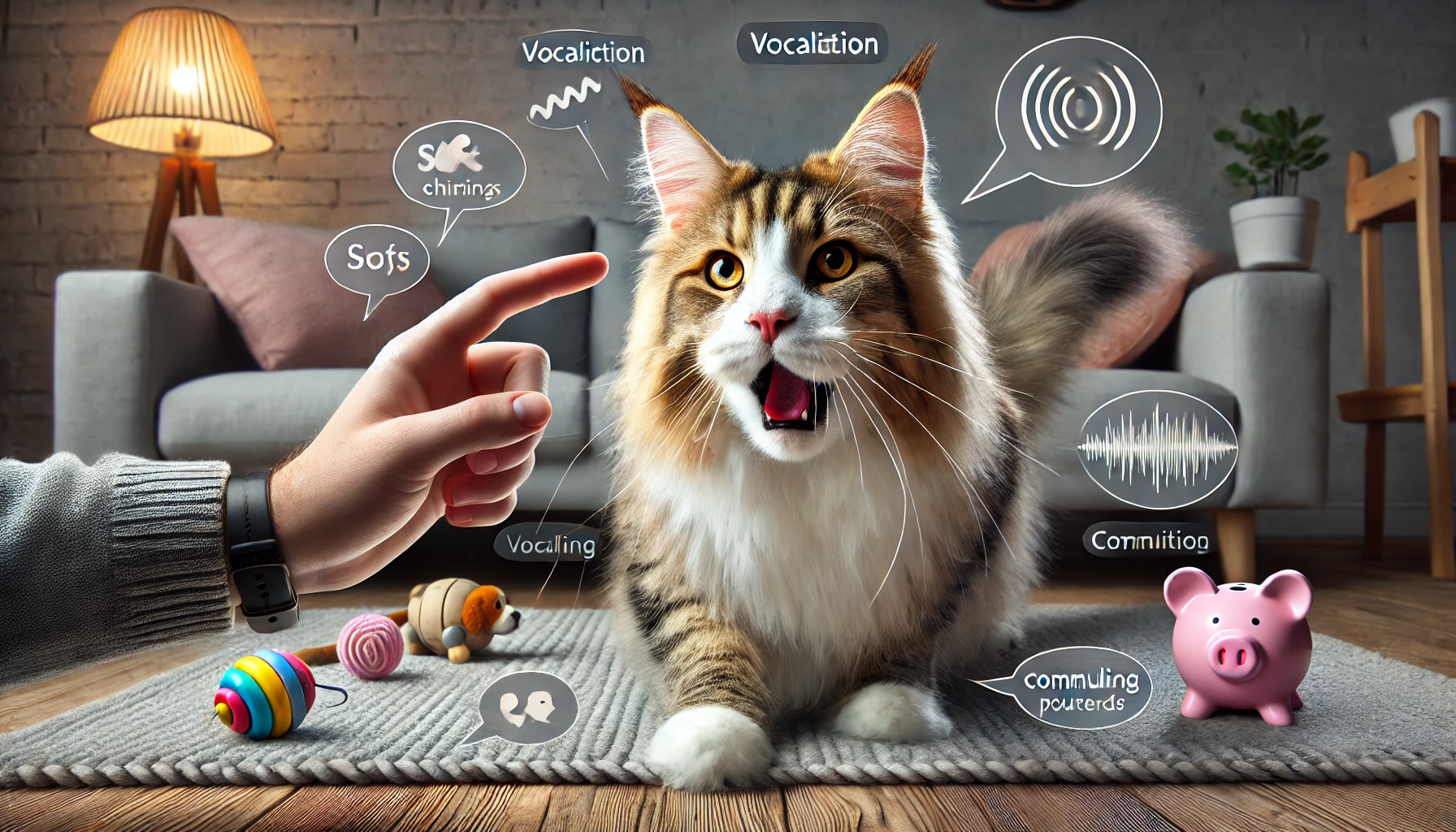
Vocalization and Communication Patterns
Maine Coon cats are known for their unique vocalizations.
Instead of the loud, insistent meow that some other breeds have, Maine Coons often use soft chirps or trills to communicate.
These sounds are charming and are usually a sign of contentment or a way to make their presence known.
While they are not typically loud or overly talkative, Maine Coons enjoy communicating with their owners through these gentle vocalizations.
Many Maine Coon owners say that their cats often ‘respond’ when spoken to, adding a level of charm and making them even more engaging as pets.
Maine Coons are affectionate, intelligent, and social cats that enjoy spending time with their families, yet they remain independent and non-demanding.
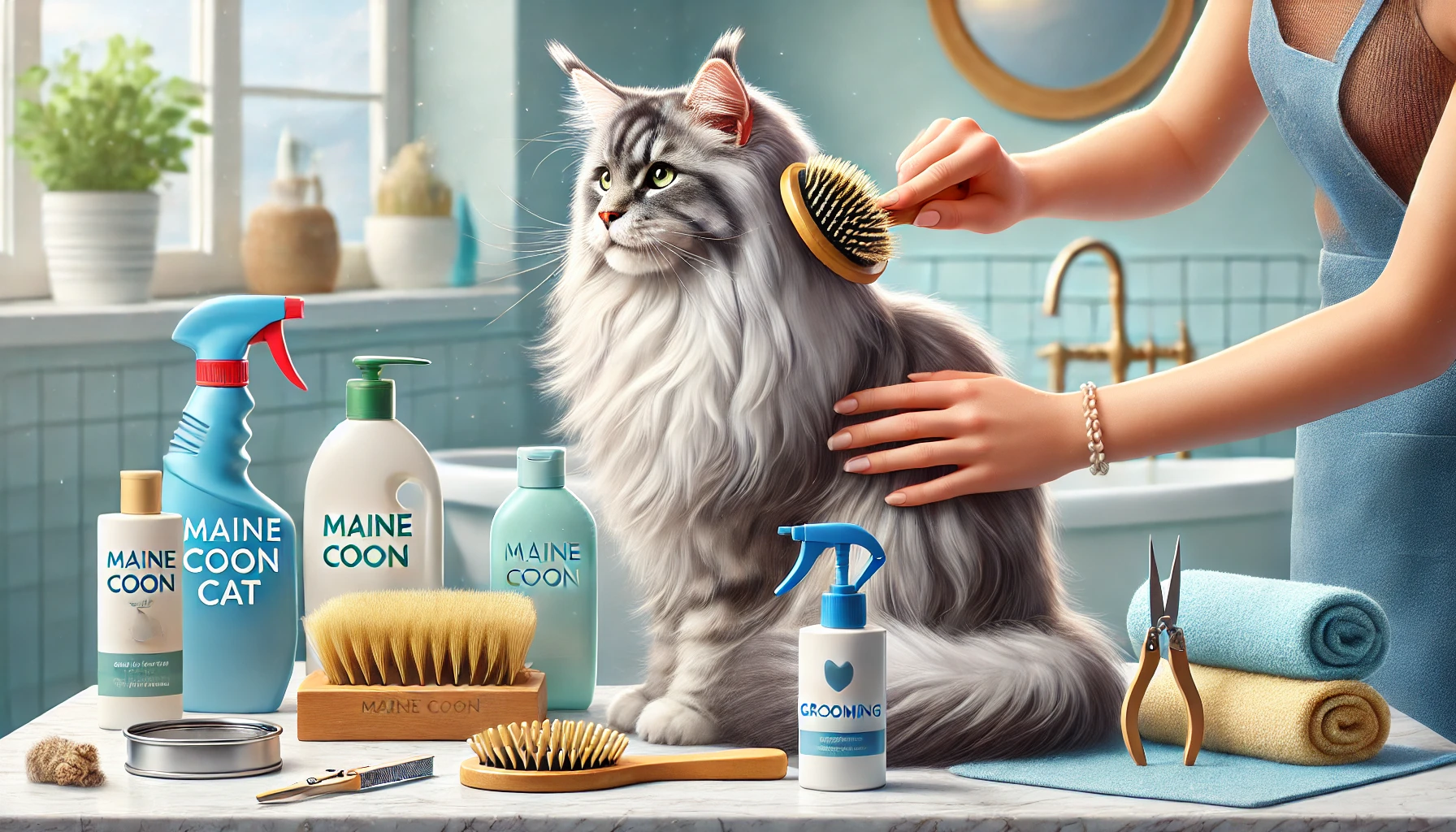
Health and Grooming for Your Maine Coon Cat
Caring for a Maine Coon cat is a bit more involved than with some other breeds due to their size and thick coat.
In general, Maine Coons are a healthy breed, but like all cats, they need regular grooming, proper nutrition, and routine veterinary care to stay in optimal health.
Here, we will cover a few key areas regarding Maine Coon health and grooming.
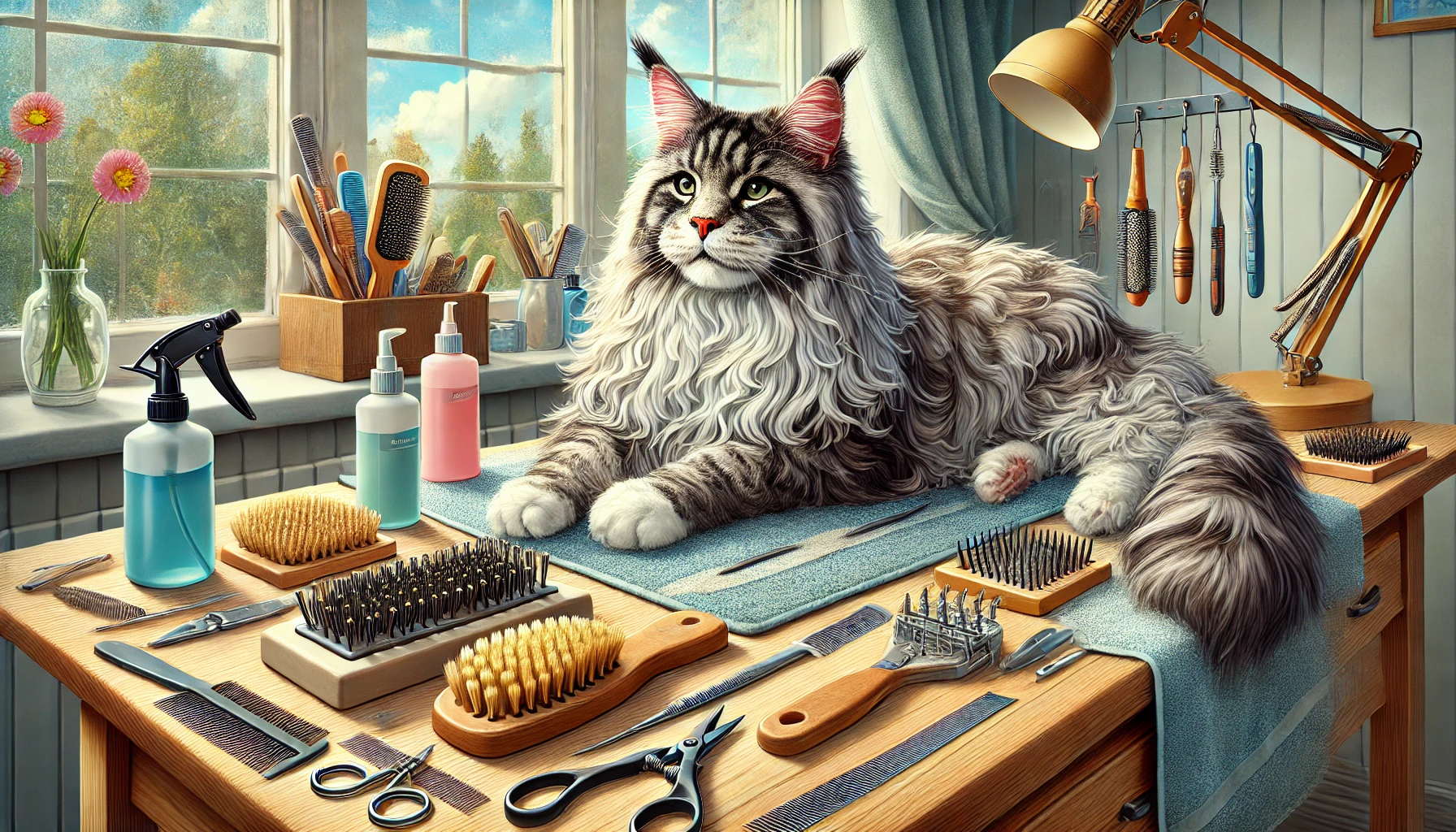
Grooming Needs of a Maine Coon
Maine Coons have thick fur, and to keep them healthy and tangle-free, they need a regular grooming routine.
While their fur is less prone to matting compared to other long-haired breeds, it’s important to brush them once or twice a week.
Regular brushing helps remove loose hair and reduces shedding, which in turn minimizes the risk of hairballs.
- Brushing: Use a good-quality cat brush or comb to brush their coat, paying particular attention to areas that are prone to tangling, such as the underbelly and hind legs.
- Bathing: While Maine Coons do not need frequent baths, an occasional bath can help maintain the shine and cleanliness of their coat. Maine Coons are also more tolerant of water than many other cats, making bath time less of a challenge.
- Nail trimming: Trim your Maine Coon’s nails regularly to prevent overgrowth and avoid damage to furniture or injury.
- Ear cleaning: Check and clean their ears regularly, as their tufted ears tend to collect more dirt and debris than some other breeds.
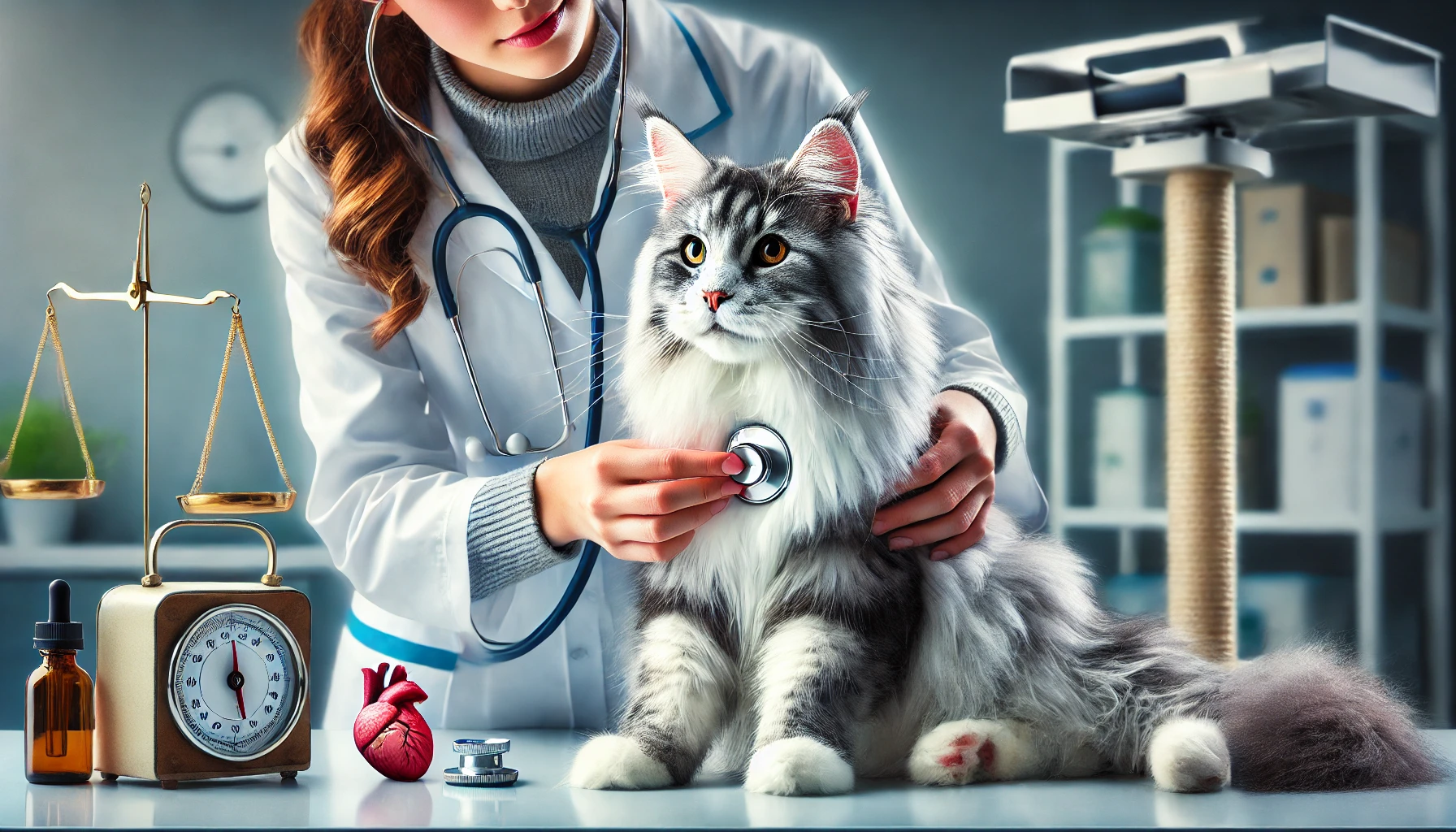
Common Health Issues in Maine Coon Cats
Although Maine Coons are generally a hardy breed, they are prone to certain genetic health problems.
Recognizing the signs and scheduling regular vet visits can help with early detection and treatment of these conditions.
- Hypertrophic Cardiomyopathy (HCM): This is the most common heart disease in cats, and Maine Coons are particularly susceptible. Regular vet check-ups and heart screenings are essential for early detection.
- Hip Dysplasia: Due to their large size, Maine Coons are at risk for hip dysplasia, which can lead to joint pain and mobility issues. Maintaining a healthy weight is important to minimize discomfort and slow the progression of this condition.
- Spinal Muscular Atrophy (SMA): This genetic disorder affects the muscles of Maine Coons, leading to muscle weakness and instability. Although there is no cure, early diagnosis can help manage symptoms and improve the cat’s quality of life.
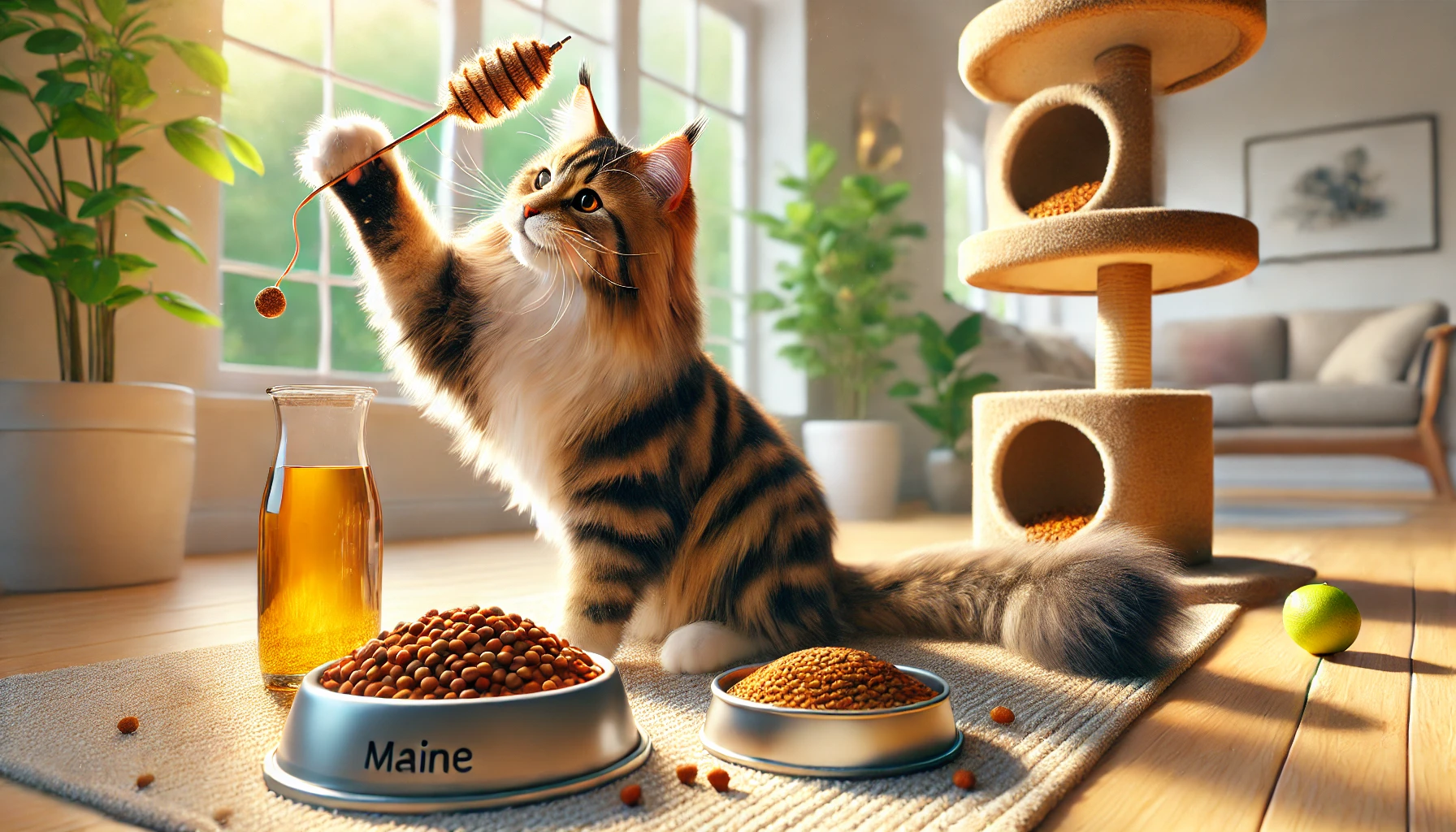
Exercise and Diet for a Healthy Maine Coon
Due to their large size, Maine Coons need a diet that supports their muscular build without leading to obesity.
It is essential to provide them with high-quality cat food that is rich in protein and low in unnecessary fillers like grains.
- High-protein food: Maine Coons thrive on a diet that includes lean protein sources such as chicken, turkey, and fish.
- Portion control: Monitor food portions to prevent overeating, which can contribute to obesity and related health issues.
- Exercise: Maine Coons are active cats and need regular playtime to stay fit. Providing them with interactive toys, climbing structures, or puzzle feeders will help keep them physically and mentally stimulated.
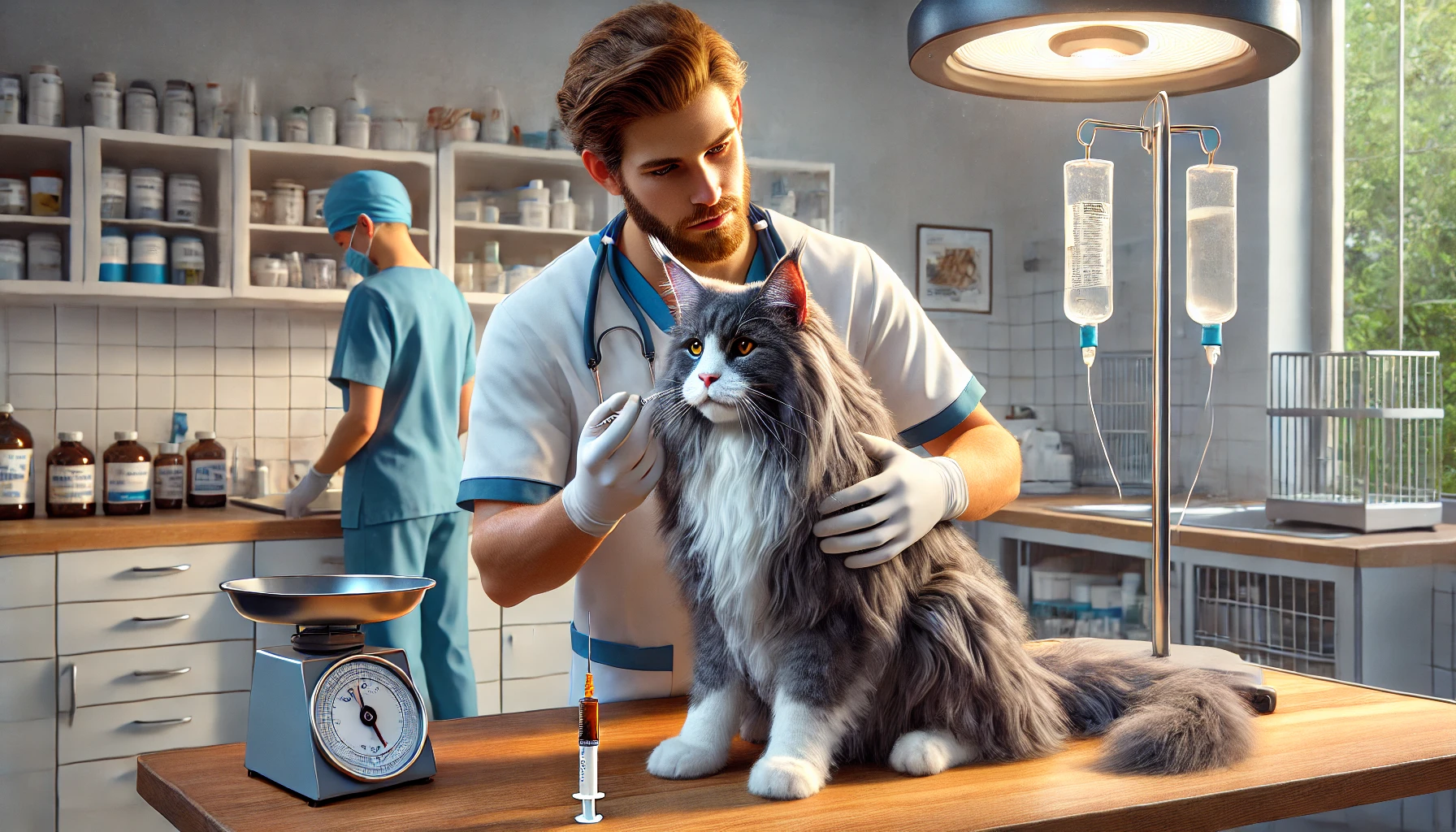
Routine Veterinary Care for Maine Coons
Like all pets, Maine Coons require routine veterinary care to stay healthy.
In addition to vaccinations and parasite prevention, annual check-ups are important for monitoring the health of their heart, joints, and weight.
Regular vet visits, particularly for heart screenings and joint evaluations, are essential for early detection of conditions like hypertrophic cardiomyopathy and hip dysplasia.
Dental exams, blood work, and physical check-ups should also be part of your Maine Coon’s routine care to ensure a long and healthy life.
Regular grooming and a high-protein diet are essential to maintaining the health of Maine Coons, especially to prevent matting and manage their large frames.
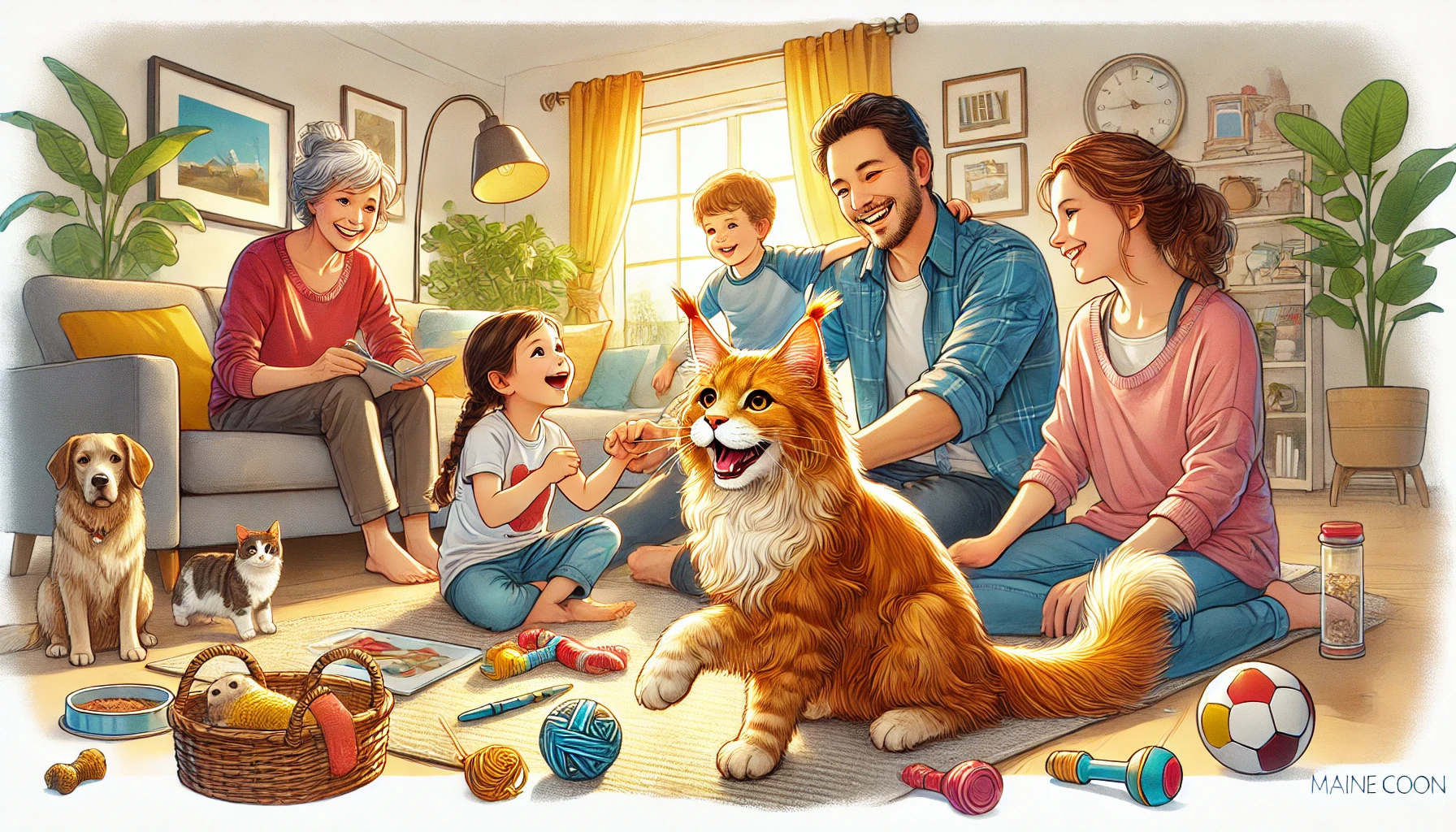
Is a Maine Coon Cat Right for You?
Getting a Maine Coon as your pet can be one of the best decisions in your life, but there are things to consider when deciding if this breed fits with you, your home, and your lifestyle.
While Maine Coons are loving, intelligent, and can adapt to various environments, their size and energy levels may not suit everyone.
Grooming also becomes a necessity for this breed.
Let’s explore the key considerations before bringing a Maine Coon into your home.
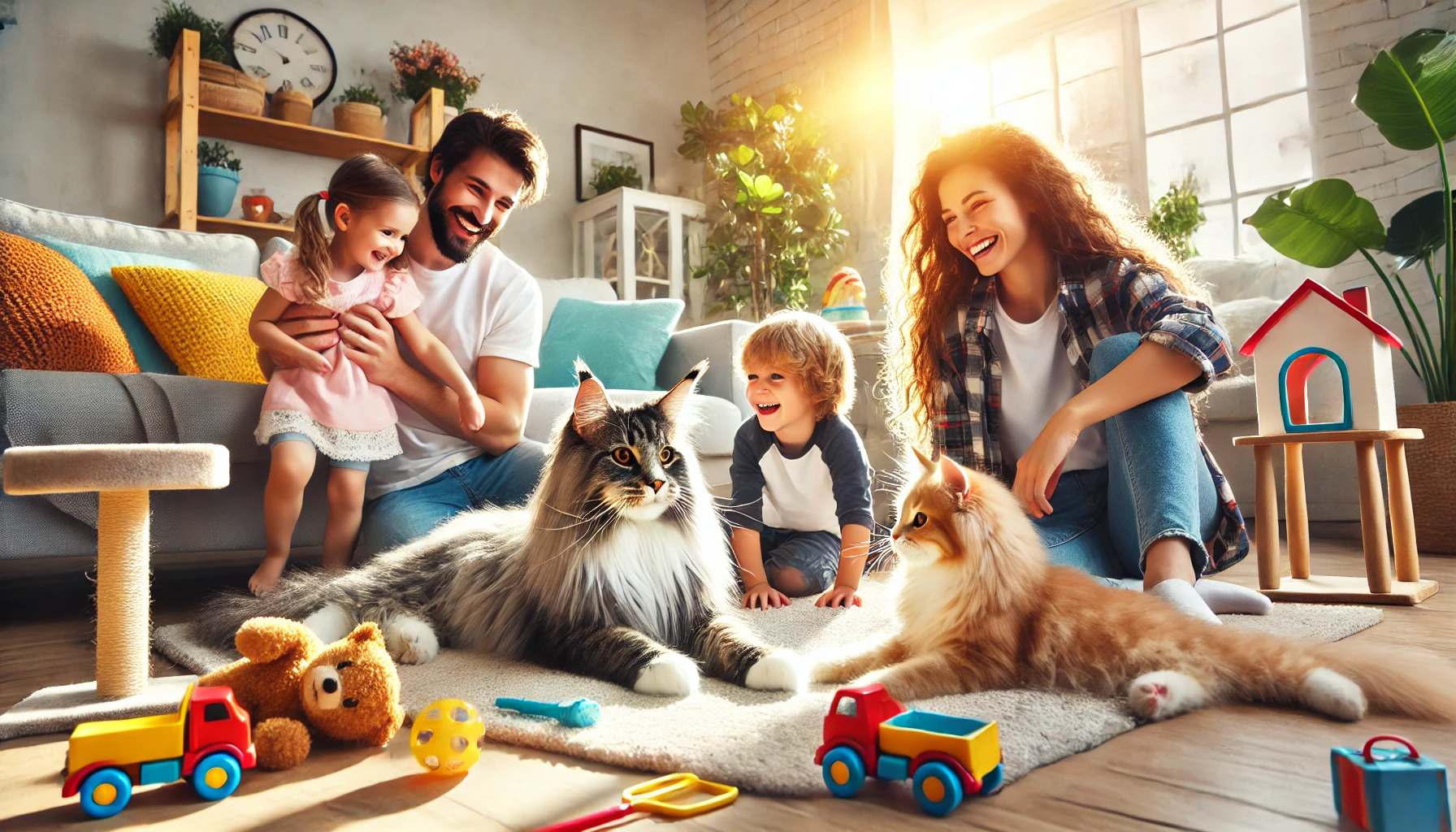
Maine Coon Cats in Family Settings
Maine Coons are among the best breeds for family environments.
Their gentle nature and excellent tolerance make them perfect for homes with children.
Maine Coons are patient, and their playful nature allows them to engage well with kids.
They enjoy games, are affectionate, but are never overly clingy or demanding.
Since Maine Coons are social, they love being part of family activities.
Whether lounging on the couch or playing with children, they enjoy spending time with their human family members.
Their size and laid-back personality make them less likely to get hurt or stressed in a busy household, which is a huge advantage if you have young kids or frequent visitors.
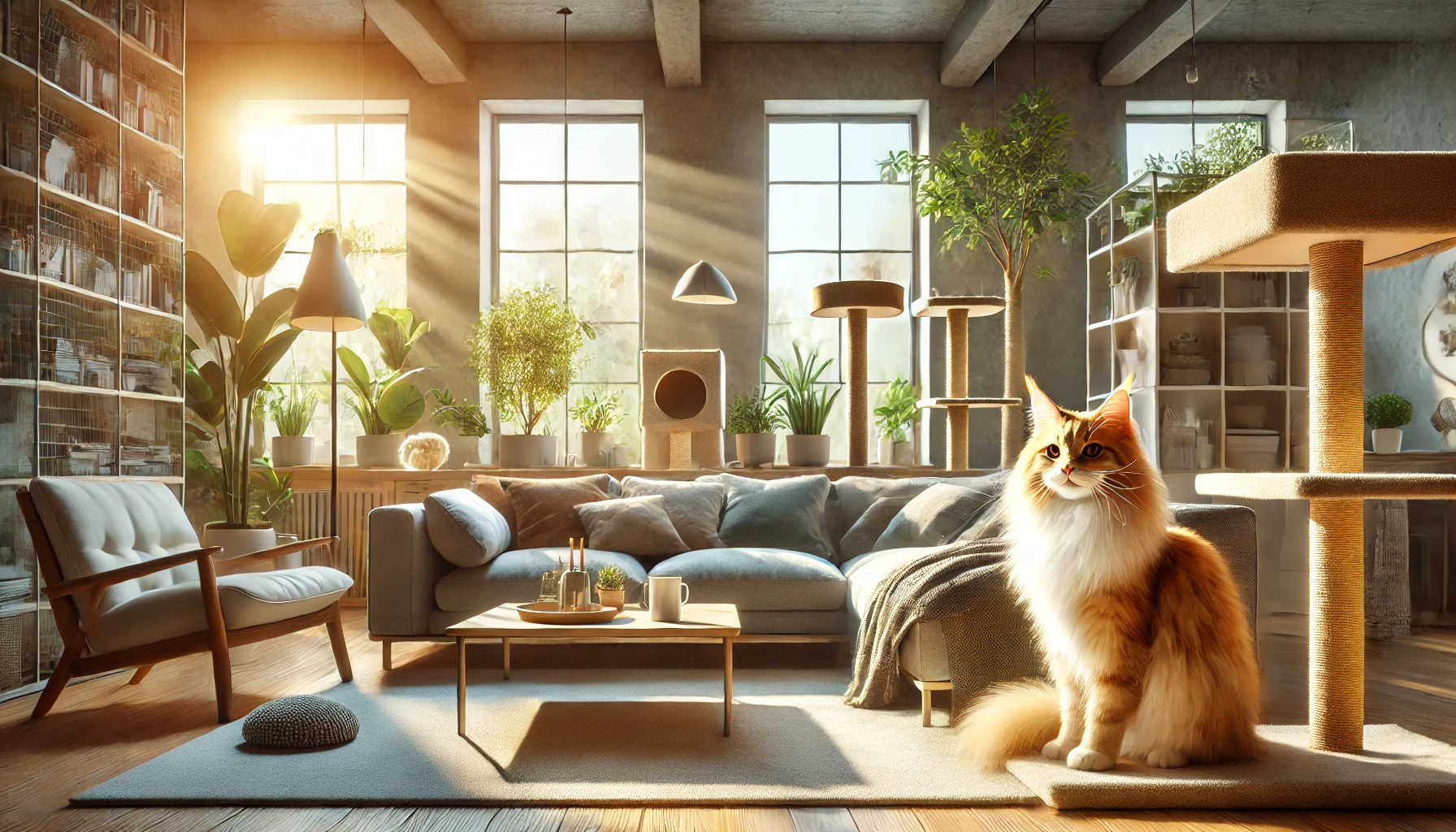
Ideal Living Conditions for Maine Coon Cats
Maine Coons are adaptable to different living conditions.
However, given their size and energy levels, they need room to move around.
A Maine Coon can live in an apartment as long as they are provided with enough stimulation and opportunities for physical activities.
- Indoor vs. Outdoor Living: Maine Coons can live both indoors and outdoors, but most experts recommend keeping them indoors to prevent accidents or injuries. If you allow them outside, make sure the area is safe and secure.
- Space to Roam: While a Maine Coon can be kept in a smaller home or apartment, make sure to provide climbing trees, scratching posts, and interactive toys to keep them mentally and physically active.
- Interaction: Maine Coons are social cats that require interaction with their humans. They do not like being left alone for long periods, so homes where someone is regularly present or where there is a companion pet are ideal.
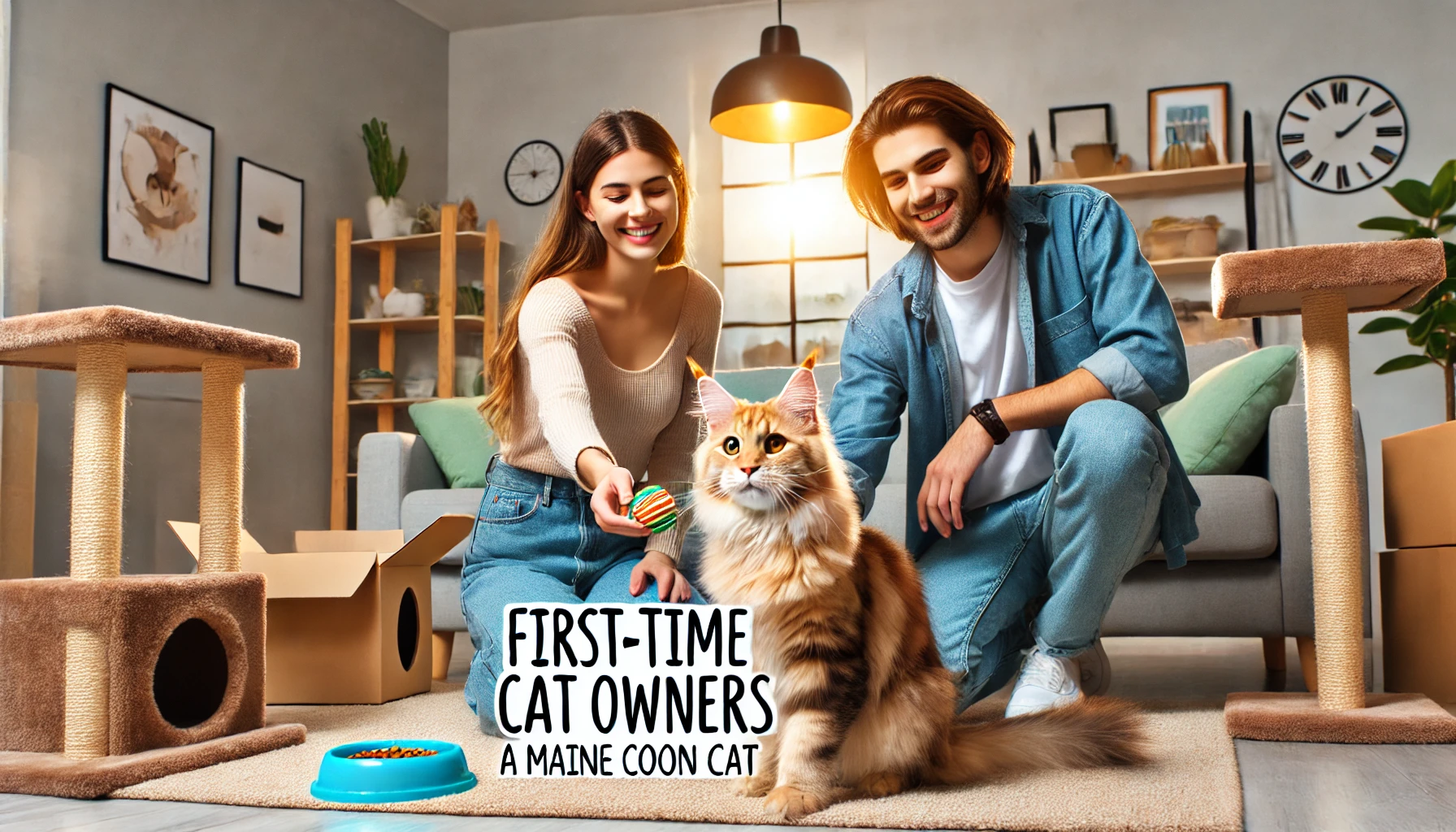
Maine Coons and First-time Cat Owners
If you are a first-time cat owner, the Maine Coon can be a great choice.
They are friendly, easygoing, and relatively low-maintenance when it comes to personality.
However, you need to be prepared for the grooming requirements that come with their long fur and the space they need due to their size.
Maine Coons are also relatively easy to train.
Their intelligence and social nature make them quick learners, which is a big advantage for first-time cat owners.
They can be taught simple commands, and their curiosity makes them eager to learn new things.
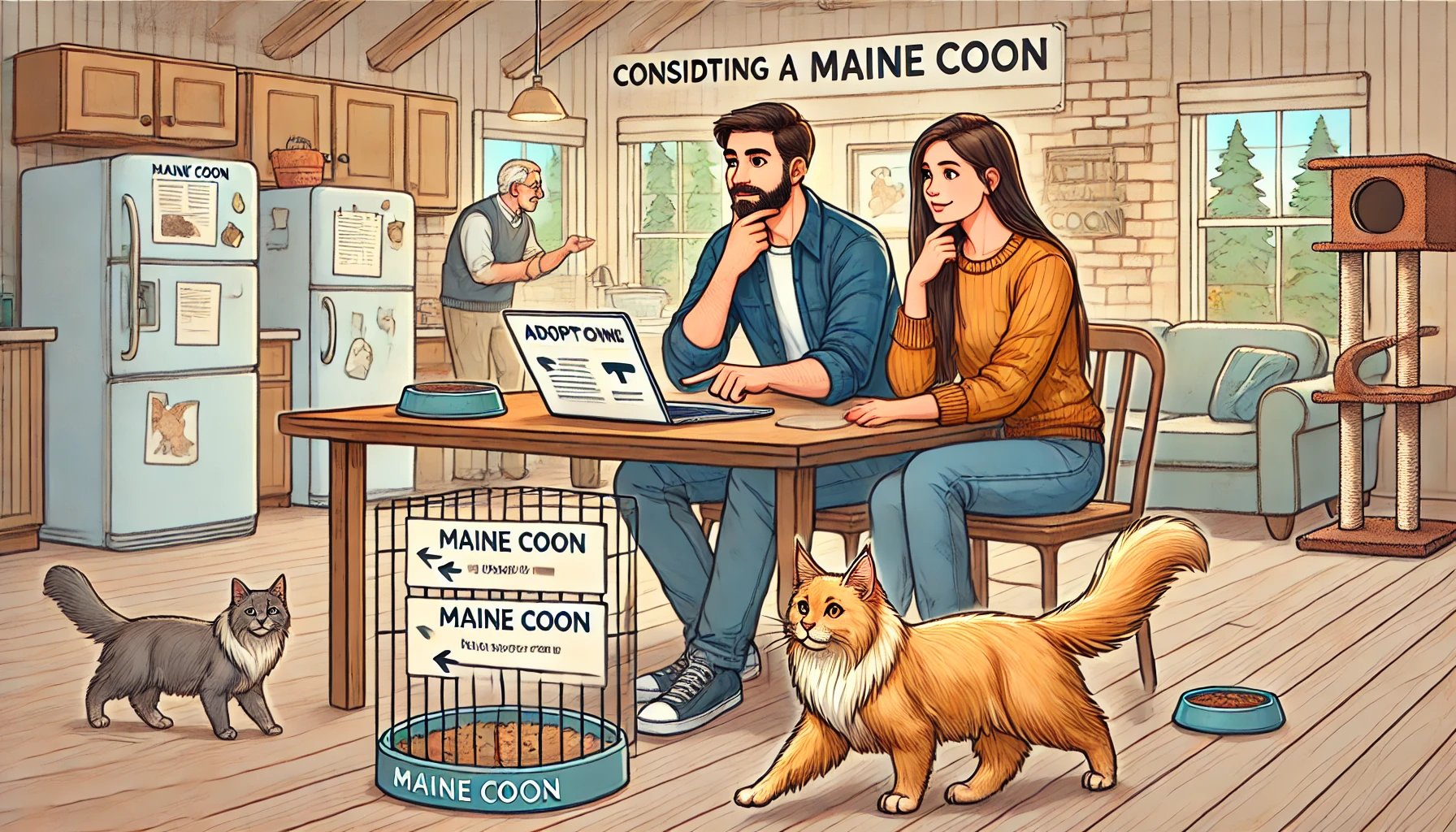
Things to Consider Before Getting a Maine Coon
Before bringing a Maine Coon into your home, here are a few things to consider:
- Grooming: Are you prepared to groom your cat regularly to prevent matting and tangling? Maine Coons have thick fur that requires attention.
- Size: Maine Coons are large cats that need space. Consider whether your home can accommodate their size and activity level.
- Time Commitment: Maine Coons are highly social and need interaction with their humans. Make sure you can dedicate time to playing and bonding with your cat.
- Companionship: If you are often away from home, think about whether a Maine Coon would need a companion pet, or if you can provide enough stimulation while you’re gone.
Maine Coons make great pets for the right family.
Their loving, loyal nature, combined with their playful and intelligent personalities, can bring joy and companionship for many years.
However, it’s important to understand their specific needs before making the commitment.
Before adopting a Maine Coon, consider their size, grooming needs, and social requirements to ensure they fit into your household.
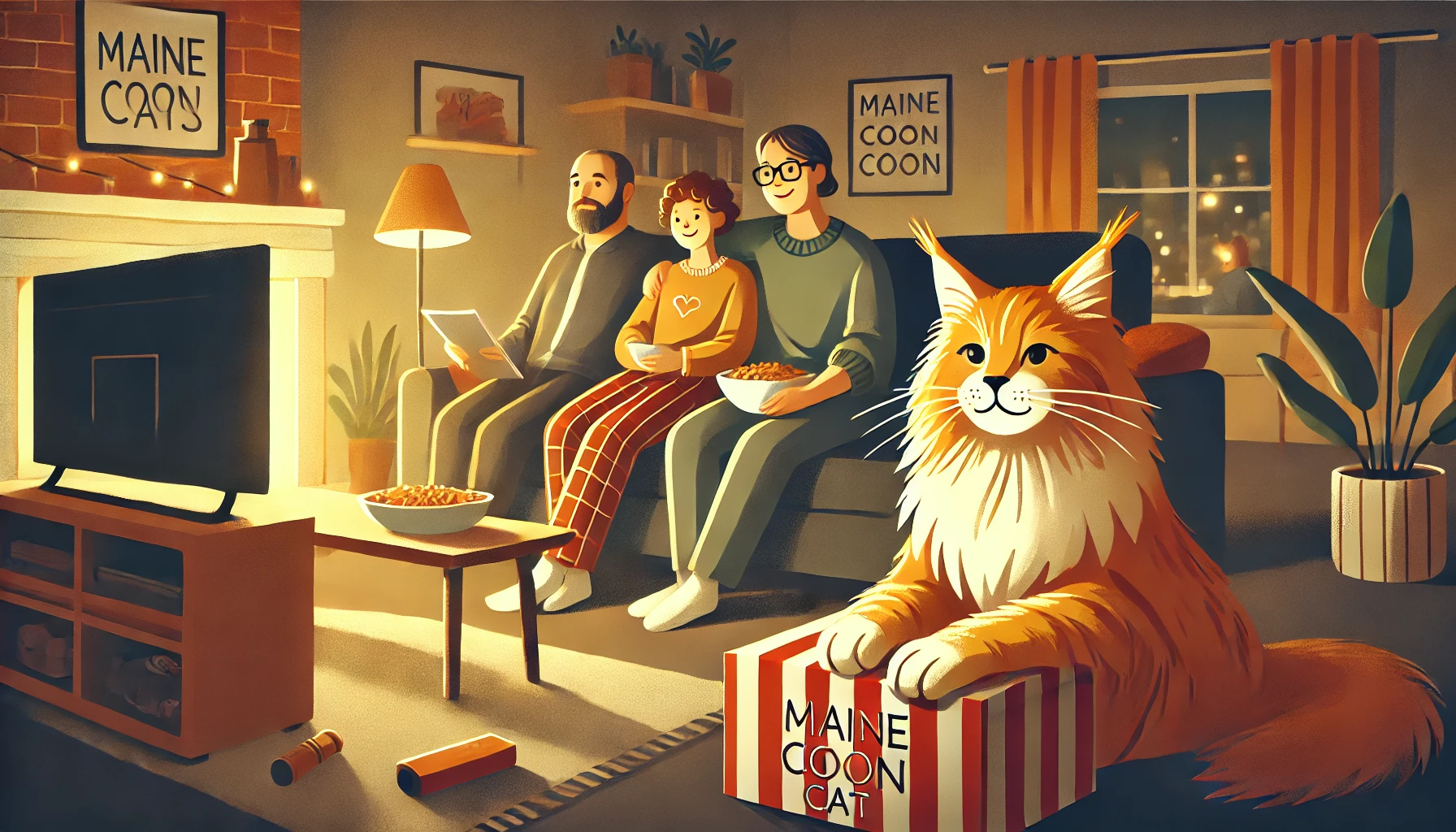
Why Maine Coon Cats Make the Perfect Companion
There are many reasons why the Maine Coon can be considered one of the most remarkable and beloved cat breeds.
From their origins as one of North America’s oldest natural breeds to their well-documented affectionate and playful nature, Maine Coons have become a favorite among cat lovers worldwide.
Their size, intelligence, and social temperament make them an excellent fit for many households, but there are specific factors to consider before bringing one into your home.
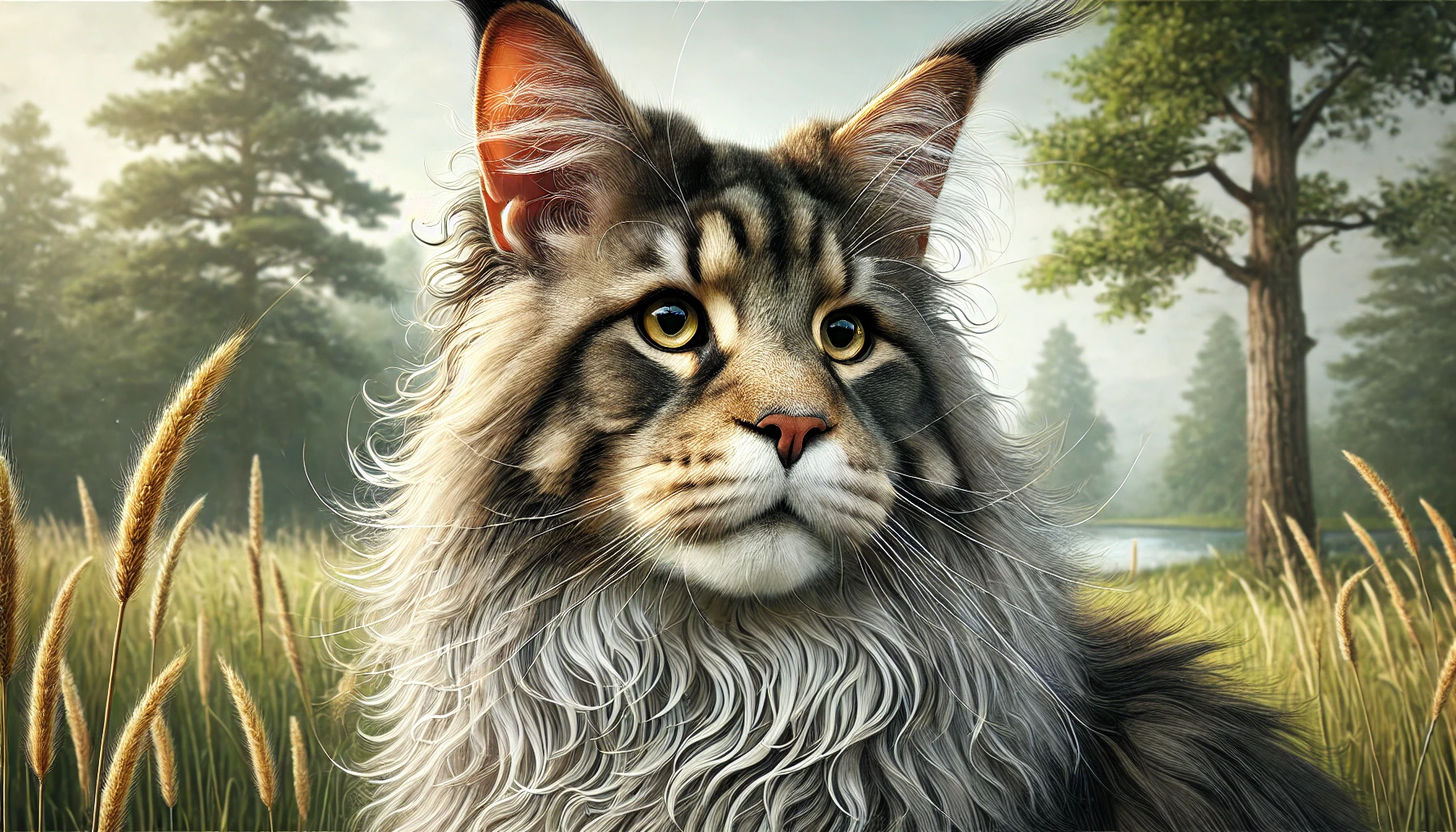
Key Characteristics That Make Maine Coons Distinctive
Maine Coons are large cats with a majestic appearance.
Their thick, water-resistant coats, tufted ears, and long, bushy tails not only set them apart but also make them visually striking.
However, it’s their personality that truly defines them:
- Intelligence: They are quick learners and easily trainable, which makes them especially attractive to first-time cat owners.
- Playfulness: Maine Coons retain much of their kitten-like energy into adulthood, an endearing quality that many families enjoy.
- Gentleness: Despite their large size, Maine Coons are known as the gentle giants of the cat world, displaying love and tolerance, especially in households with children or other pets.
- Adaptability: Whether living in a busy family home or a quiet apartment, Maine Coons can adjust to various living environments, as long as their needs for space, playtime, and interaction are met.
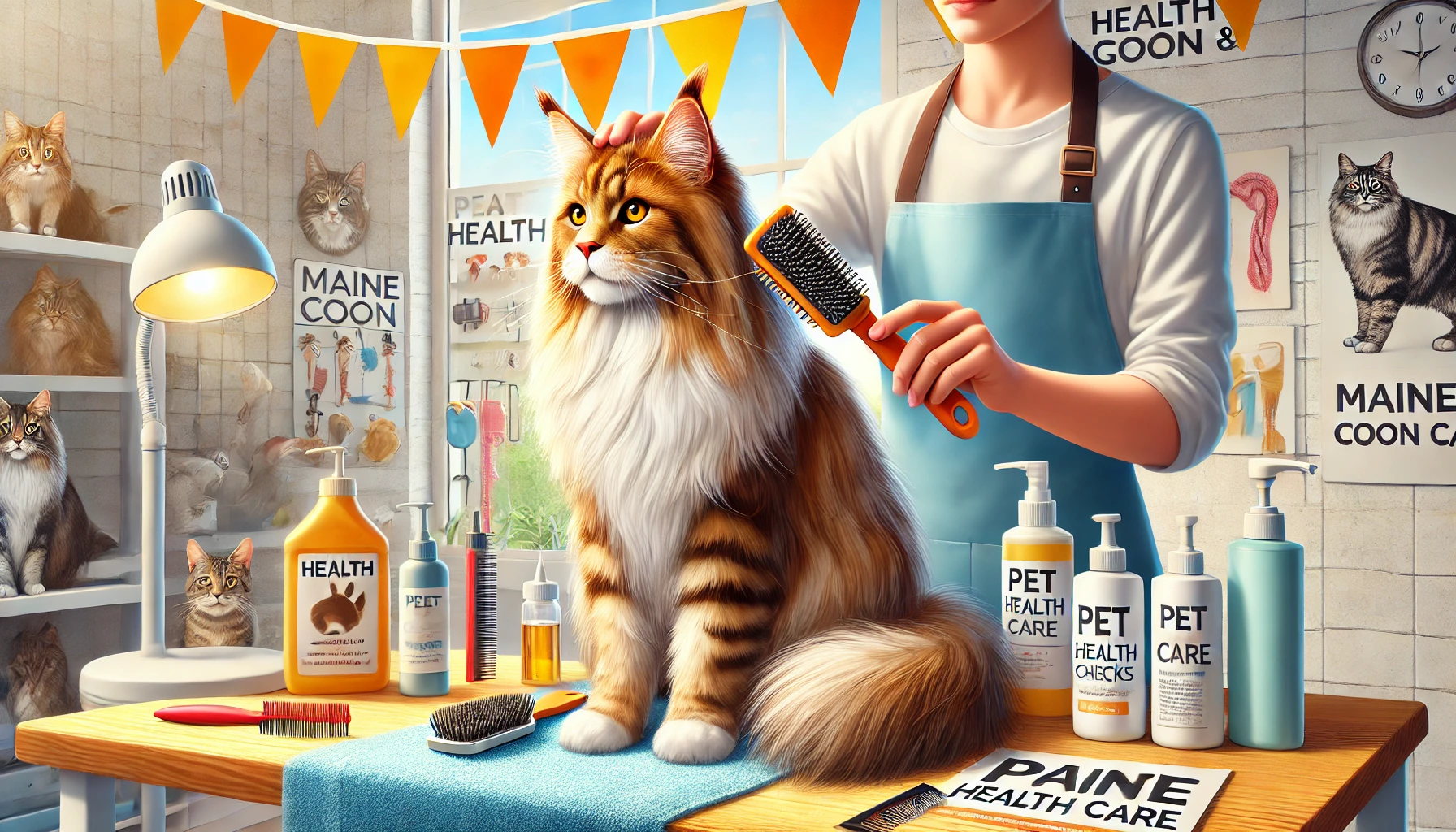
Commitment to Health and Grooming
Caring for a Maine Coon includes regular grooming, a proper diet, and routine veterinary check-ups.
Their thick fur needs frequent brushing to prevent matting, while a high-protein diet supports their large and muscular frames.
Regular vet visits can help prevent potential health concerns common in the breed, such as hypertrophic cardiomyopathy and hip dysplasia.
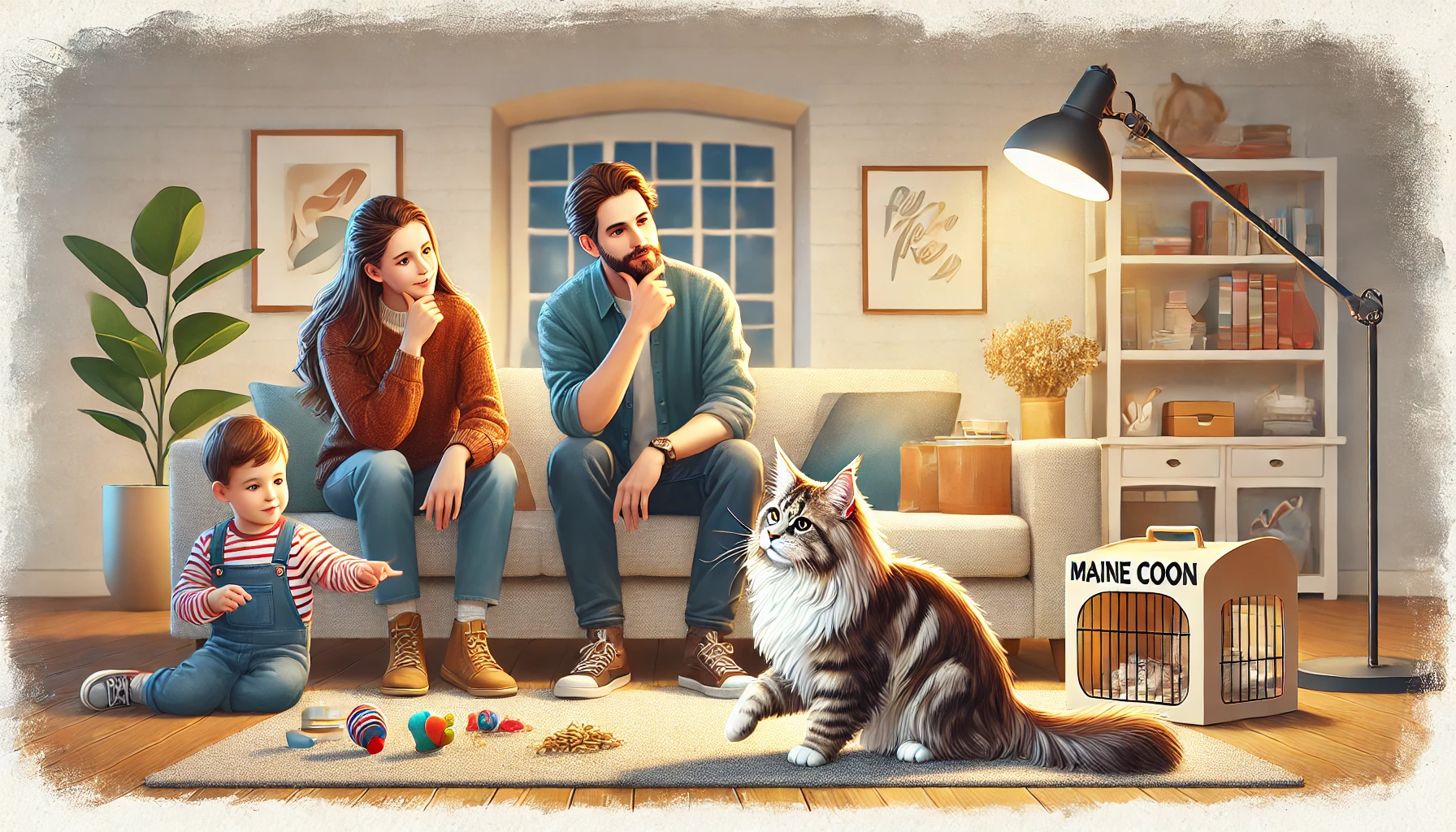
Is a Maine Coon Cat Right for You?
Ultimately, deciding if a Maine Coon is the right fit for you depends on your ability to meet their grooming and social needs.
Maine Coons are affectionate and intelligent cats that thrive on interaction.
If you provide them with the space, time, and attention they need, they will reward you with loyalty, love, and endless companionship.
Maine Coon cats make perfect companions thanks to their fantastic looks, easygoing nature, and friendly temperament.
For those willing to invest time and care, this remarkable breed promises a healthy and fulfilling life together.
Their intelligence, playfulness, and gentleness make Maine Coons an ideal choice for families and cat lovers seeking a loyal companion.
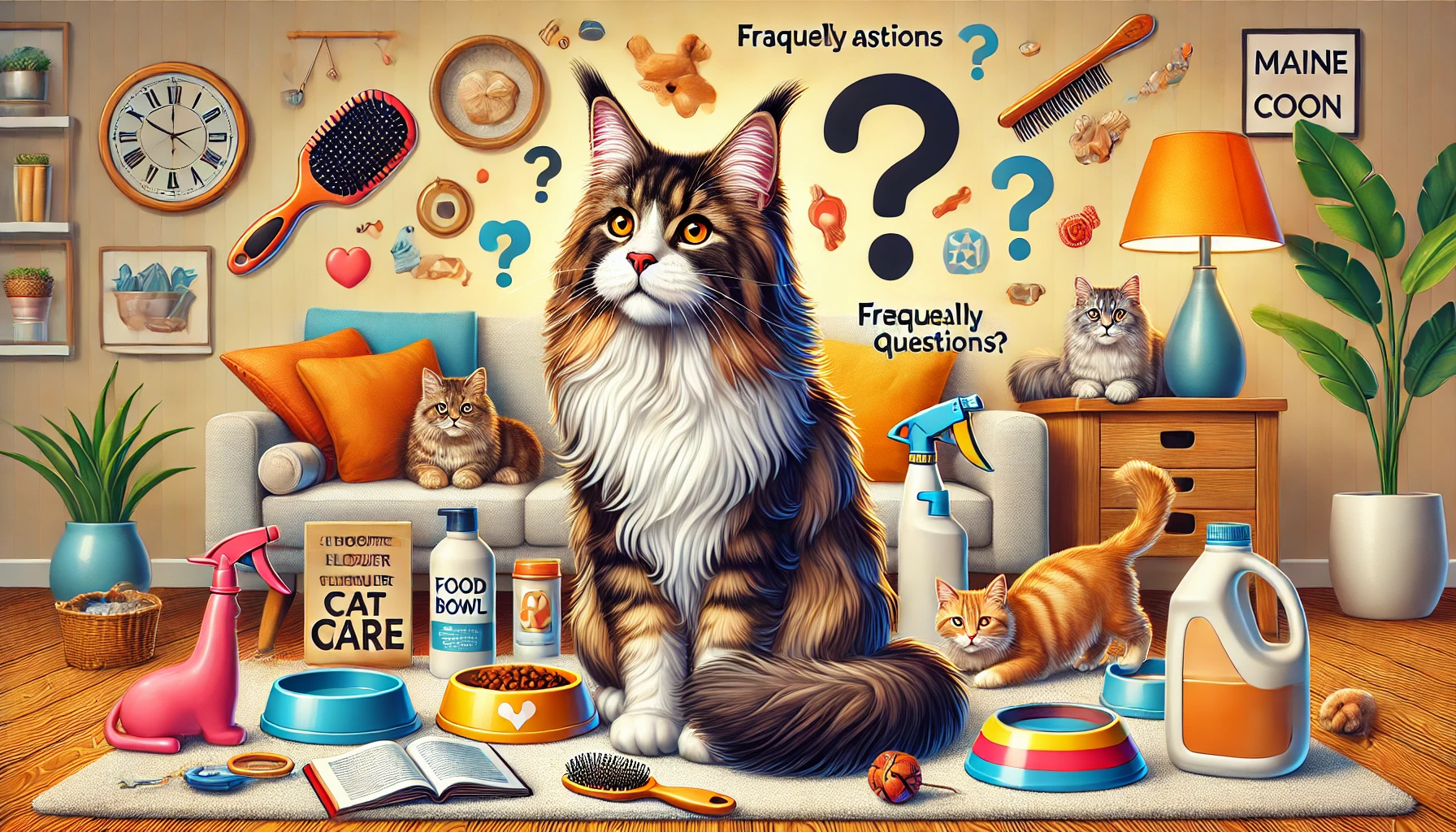
FAQs About Maine Coon Cats
Maine Coon cats are a very popular breed with a wide range of unique characteristics and traits.
Here are some of the most common questions asked by potential Maine Coon owners, along with brief answers to help you get to know this amazing breed better.
How large are Maine Coon cats on average?
The Maine Coon breed is one of the largest domesticated cat varieties.
Males typically weigh between 13 to 18 pounds, while females fall between 8 to 12 pounds.
Some Maine Coons can grow even larger, reaching lengths up to 40 inches.
Are Maine Coons compatible with children and other pets?
Yes, they are gentle and accommodating.
Maine Coons do great with children and other pets, making them an excellent family cat.
Playful yet calm, they fit well in most social environments.
How much grooming does a Maine Coon require?
Since Maine Coons have long, thick fur, frequent grooming is a must.
Regular brushing two to three times a week helps prevent matting and keeps their coat healthy.
Occasional bathing and nail trimming are also advisable.
Are Maine Coons prone to any particular health problems?
Maine Coons are generally healthy, but they are prone to conditions like hypertrophic cardiomyopathy (HCM), hip dysplasia, and spinal muscular atrophy (SMA).
Regular vet check-ups can help manage these issues early on.
Do Maine Coons need a lot of space to live comfortably?
Due to their large size, Maine Coons need enough space to roam and play.
However, they can adapt to apartment living if they are provided with interactive toys, climbing structures, and plenty of attention from their human companions.
Are Maine Coons vocal cats?
Yes, Maine Coons are among the most vocal cat breeds, often using soft chirps and trills to communicate.
They are not as loud as some other breeds, but they love to engage with their owners through these gentle sounds.
How long is the average lifespan of a Maine Coon cat?
On average, Maine Coon cats live between 12 to 15 years.
With proper nutrition, regular veterinary care, and mental stimulation, some Maine Coons can live up to 18 years or more.

